












Privacy



Guardian

Workforce
Create

Safety Stay


Schedule
St A ff Directory
Robert O’Koniewski, Esq. executive Vice President rokoniewski@msada.org
Jean Fabrizio Director of Administration jfabrizio@msada.org
Auto De A ler MAg A zine
Robert O’Koniewski, Esq. executive editor MSADA o ne McKinley Square Sixth f loor Boston, MA 02109
Subscriptions provided annually to Massachusetts member dealers. All address changes should be submitted to MSADA by e-mail: jfabrizio@msada.org
Auto Dealer is published by the Massachusetts State Automobile Dealers Association, inc. to provide information about the Bay State auto retail industry and news of MSADA and its membership.
AD Directory complyAuto, 2 ethos group, 49 gW Marketing Services, 39 Marcum, 41 Merchant Advocate, 35 nancy Phillips, 39 ocD tech, 43 PlugStar/Plug in America, 47 reynolds & reynolds, 44 Sprague energy, 56 Withum, 59
ADVertiSing rAteS inquire for multiple-insertion discounts or full Media Kit. e-mail jfabrizio@msada.org

us on X at @MassAutoDealers

Appreciation?

By Jeb Balise, MSADA President
Election Day – November 5 – soon will be upon us. The results that day will have considerable implications.
Who holds what offices will determine to what extent the business community will be regulated (over-regulated?). It seems each year the same founding American principle is under attack: free enterprise. Of course, the scope of that problem is well beyond any one industry. In our corner of the world, we use several outreach programs during the year to visit with our Members of Congress to make sure our representatives understand that the policies they pursue should be focused on making it easier to do business, not harder. We are not seeking any special favors or privileges, just a level playing field. To be able to confront such challenges, it is always important to engage our elected politicians and regulatory parties at all levels. As we previewed in last month’s magazine and cover in this month’s issue, September’s NADA Washington Conference afforded us the opportunity to meet with our Members of Congress and their staffs to provide the dealer side of several on-going matters that impact our businesses and the livelihood of our employees.
Without our input, politicians would be free to decide matters unaware of our perspective, which is never a good thing.
I want to thank the dealers who traveled to D.C. for the annual conference with MSADA Executive Vice President Robert O’Koniewski to make sure our voice is heard:
MSADA Immediate Past President Chris Connolly of Herb Connolly Chevrolet; Next Gen dealers Chad Bouchard of the Ron Bouchard Auto Stores, plus Ruddy Brito and Vinnie and Rich Mastria of the Mastria Auto Group; and Ray and Brianna Butler of Midstate Mitsubishi. More importantly, Vinnie, Rich, Ray, and Brianna were first-time attendees. It is vital to our success as an organization that our next generation of dealership leaders become involved with our legislative outreach.
We can never stop putting effort into making sure our representatives know who we are, what we do, and how vital our contribution is to their districts and our communities. Without our input, politicians would be free to decide matters unaware of our perspective, which is never a good thing.
I want to continue to stress the importance of your voice in this process. We make the trip down to D.C. so you do not have to, but that does not mean you should not pick up the phone and let your legislator know what issues you care about as an important economic engine in their community. Please let me or Bob know if you would like any talking points or other tips for representing our business.
Barnstable County
Brad tracy, tracy Volkswagen
Berkshire County
Brian Bedard, Bedard Brothers Auto Sales
Bristol County richard Mastria, Mastria Auto group
Essex County
William Deluca iii, Bill Deluca family of Dealerships
Paul Bertoli, Priority chryslerJeep Dodge ram
Franklin County [open]
Hampden County
Jeb Balise, Balise Auto group
Hampshire County
Bryan Burke, Burke chevrolet
Middlesex County frank Hanenberger, MetroWest Subaru
Norfolk County
Jack Madden, Jr., Jack Madden ford charles tufankjian, toyota Scion of Braintree
Plymouth County
christine Alicandro, Marty’s Buick gMc isuzu
Suffolk County [open]
Worcester County
Steven Sewell, Westboro chrysler Dodge ram Jeep
Steve Salvadore, Salvadore Auto
Medium/Heavy-Duty Truck Dealer
Director-at-Large [open]
Immediate Past President
chris connolly, Jr., Herb connolly chevrolet
NADA Director
Scott Dube, Mcgovern Hyundai rt.93
OFFICERs
President, Jeb Balise
Vice President, Steve Sewell
Treasurer, Jack Madden, Jr.
Clerk, c harles tufankjian

ACV Auctions
Steve Sirko (856) 381-3914
ADESA
Elizabeth Morich (508) 270-5400
Albin, Randall & Bennett
Barton D. Haag (207) 772-1981
Allied Recycling Center
Joseph Castaneda (781) 316-7180
American Fidelity Assurance Co.
Kathleen Weisenbach (402) 523-5945
America’s Auto Auction Boston
Chris Colocousis (774) 218-8930
ArentFox LLP
Paul Marshall Harris (617) 973-6179
Sarah Decatur Judge (617) 973-6184
Armatus Dealer Uplift
Joe Jankowski (410) 391-5701
Assurant Dealer Services
Sean Skinner (603) 660-3647
Auto Auction of New England
Steven DeLuca (603) 437-5700
Bank of America Merrill Lynch
Dan Duda and Nancy Price (781) 534-8543
Bellavia Blatt
Leonard Bellavia (516) 873-3000
Broadway Equipment Company
Fred Bauer (860) 798-5869
Brown & Brown Dealer Services
Jason Bayko (508) 624-4344
CDK Global
Rob Steele (508) 564-1346
Clifton Larson Allen
Rick Parmelee (860) 982-9307
Cooperative Systems
Scott Spatz (860) 250-4965
Cox Automotive
Polly Penna (303) 981-1298
Creative Resources Group
Charlie Rasak (508) 726-7544
CVR
John Alviggi (267) 419-3261
Dave Cantin Group
Woody Woodward (401) 465-7000
Dealer Alchemist
Jeremy Wilson (804) 564-5740
Dealer Pay
Shannon Wischmeyer (636) 293-8038
Downey & Company
Paul McGovern (781) 849-3100
DP Sales Distributors
Andrew Prussack {631) 842-7549
Driving Dealer Performance
Kimberly Guerin (978) 760-0322
Eastern Bank
David Sawyer (617) 620-3484
EasyCare New England
Greg Gomer (617) 967-0303
Ethos Group, Inc.
Drew Spring (617) 694-9761
F&I Direct
Sean Wiita (508) 414-0706
Michelle Salas (508) 599-0081
Federated Insurance
Kevin Sundberg (559) 547-9694
Fisher Phillips LLP
Joe Ambash (617) 532-9320
Jeff Fritz (617) 532-9325
Josh Nadreau (617) 532-9323
Freedom Solar Power
Ryan Ferrero (970) 214-4433
GW Marketing Services
Gordon Wisbach (857) 404-0226 Hilb
Group
James Pietro (508) 791-5566
Huntington National Bank
Mark Flibotte (781) 724-3749
iHeart Media
Paul Kelley (757) 328-1431
ION Bank
Timothy Rourke (203) 439-9400
JM&A Group
Chris “KC” Hwang (954) 415-6961
JM Electrical Co.
Christopher Cedrone (781) 581-3328
John W. Furrh Associates Inc.
Pamela Barr (508) 824-4939
Key Bank
Tom Flynn (716) 998-6247
KPA
Abe Cohen (503) 902-6567
M & T Bank
John Federici (401) 642-5622
Marcum LLP
Nichole Rene (203) 781-9690
McWalter Volunteer Benefits Group
Shawn Allen (617) 483-0359
Merchant Advocate, LLC
Dan Giordano (973) 897-2778
Mintz Levin
Kurt Steinkrauss (617) 542-6000
Murtha Cullina
Thomas Vangel (617) 457-4000
Nancy Phillips Associates, Inc.
Nancy Phillips (603) 658-0004
National Business Brokers
Peter DiPersia (603) 881-3895
National Grid
Nicole Caruso-Carlin (347) 426-6331
NEAD Insurance Trust
Charles Muise (781) 706-6944
Northeast Dealer Services
Johna Cutlip (401) 243-7331
OCD Tech
Michael Hammond (844) 623-8324
Performance Brokerage Services
Jacob Stoehr (847) 323-0014
Performance Management Group, Inc.
Dale Ducasse (508) 393-1400
Piper Consulting
Jim Piper (207) 754-0789
Plug In America
Joel Levin (237) 925-1364
Portfolio
J. Gregory Hoffman (800) 761-4546
Priority Payments Local
Andrew Pollina (732) 372-4352
Pullman & Comley LLC
James F. Martin, Esq. (413) 314-6160
Reynolds & Reynolds
Austin Ziske (802) 505-0016
Rockland Trust Co.
Joseph Herzog (508)-830-3241
Santander Bank
Richard Anderson (401) 432-0749
Chris Peck (508) 314-1283
Schlossberg, LLC
Michael O’Neil, Esq. (781) 848-5028
Shepherd & Goldstein CPA
Ron Masiello (508) 757-3311
Southern Auto Auction
Joe Derohanian (860) 292-7500
Sprague Energy
Steve Borelli (508) 768-5252
The Towne Law Firm P.C.
James T. Towne, Jr. (518) 452-1800
TrueCar
Pat Watson (803) 360-6094
Truist
Andrew Carmer (401) 409-9467
US Bank
Vincent Gaglia (716) 649-0581
Wells Fargo Dealer Services
Rich DeFreitas (857) 205-2780
Withum
Kevin Carnes (617) 471-1120
Zurich American Insurance Company
Steven Megee (774) 210-0092

By Robert O’Koniewski, Esq.
MSADA Executive Vice President
rokoniewski@msada.org
Follow us on X (formerly Twitter) • @MassAutoDealers
The National Automobile Dealers Association rang the bell once again for 2024 and asked its member dealers to hit our Nation’s capital in mid-September for its 49th version of its annual Washington Conference. For those who attended, there was no lack of issues and attendee camaraderie.
Every time we travel to D.C. for our annual NADA confab, it never ceases to amaze just how insular their world is in the 2-0-2 area code. There is surely no place on Earth like it. That is why our visits with our elected officials are so important. They need to hear from their local businessmen and women – our member dealers – on a continual basis to fully grasp our importance to the local, state, and national economies.
Putting aside the cynicism and skepticism about the ability of getting anything done positively for our nation, when in Washington it is always important for dealers to remember why they are there and to stay in their own lane regarding those issues important to our industry. We have been successful over the years by avoiding the very fights everyone else seems to want to jump into, regardless of the relevancy to their own industries. When in D.C., we step gingerly into the sandbox others use as a smack down pit.
Dealers and their association executives from across the country use the annual Washington Conference to meet with their Senators and Representatives to discuss various legislative and regulatory issues affecting dealership operations. This is also a chance for dealers to see their legislators
in the halls of power where they conduct their business, in contrast to the usual district functions like chamber of commerce rubber-chicken luncheons, holiday parades, and ribbon cuttings.
NADA, as part of the festivities, in addition to policy briefings and other NADA-related materials, schedules politicians and commentators to provide attendees with a flavor of the current situation in Washington and what may be in store for us prospectively. As we flew in, we find ourselves deep into this presidential election year, in which the full House and one-third of the Senate are standing for election which will determine who will control those chambers. This year’s crop of speakers included Rep. Cathy McMorris Rodgers (R-Washington), the chair of the House Energy and Commerce Committee, and David Wasserman, senior election analyst for the Cook Political Report.
Your MSADA delegation consisted of MSADA Immediate Past President Chris Connolly of Herb Connolly Chevrolet; Next Gen attendees Chad Bouchard of Ron Bouchard’s Auto Stores; Ruddy Brito of the Mastria Auto Group as well as his colleagues Vincent and Richie Mastria, who were first-time attendees; Ray Butler and his daughter, Brianna, of Midstate Mitsubishi, also first-time attendees; and yours truly.
Once on Capitol Hill, we engaged in dealer dialogue on such issues as defunding the Federal Trade Commission’s enforcement of its anti-dealer Vehicle Shopping Rule, which was promulgated in late 2023; catalytic converter anti-theft legisla-
tion; so-called “right to repair” legislation; and defunding the EPA’s efforts to impose onerous rules on fuel economy standards and EV mandates.
During our two days of meetings in D.C., we conferred with Rep. William Keating (D-Bourne) and staff members for Reps. Lori Trahan (D-Westford), Jake Auchincloss (D-Newton), Jim McGovern (D-Worcester), Stephen Lynch (D-South Boston), Katherine Clark (D-Melrose), Seth Moulton (D-Salem), and Richard Neal (D-Springfield), and Sen. Ed Markey (D).
Moving forward, we need to keep in mind that for two days we collectively were a group of small businessmen and women who, on behalf of their fellow dealers back home, gave up time from their dealerships and families to fly to Washington to discuss issues important to their stores and making sure the economy remains progressing in a positive direction. Back home in the Commonwealth, however, we are an association of 427 members, whose dealerships employ on average 60 men and women, and who are responsible for almost 20 percent of the Commonwealth’s retail economy.
There always exists a great need to go before our elected officials and inform them of our concerns and desires. As we ask dealers to get more engaged in contacting their Congresspeople and local legislators, we ask that you not be shy and let others carry the load. All dealers – big and small, domestic makes and international – are in the same boat. If we give the Members of Congress a free ride and do not engage them on the issues, they will think we have no problems. The same is true when we are fighting for or against certain laws on Beacon Hill.
In the future, please heed the call from your Association to contact your elected officials when issues arise. Without our input, our esteemed Members of Congress, if left to their own devices, could find a way to pour more gasoline on the fire. After all, the easiest vote they can take is one in which no one talks to them.
Massachusetts car and truck dealers presently operate under a regimen of vehicle emissions rules that essentially originate from unelected bureaucrats housed in California. As has been written in these pages previously, Massachusetts’s adoption of the California rules will have major implications for dealership operations of all sizes and types.
Under the U.S. Clean Air Act, a state may obtain a waiver to establish emissions rules that are stricter than that which are set by the federal government. California many decades ago undertook that process and received a federal waiver from the Environmental Protection Agency. The California Air Resources Board continuously establishes rules which the EPA must sign off on, as set in federal law.
Over 30 years ago, Massachusetts enacted a law – MGL Chapter 111, Section 142K – which requires the adoption of California’s standards for motor vehicle emissions as long as those standards achieve greater emissions reductions than federal standards. Under our law, the Legislature is charged with addressing problems with the Commonwealth’s compliance with the CARB standards should issues arise.
CARB, since the 1990s, has set emissions and EV commitment requirements for passenger vehicles and trucks of all class sizes (2-8). This includes the Advanced Clean Cars II (ACC II) Rule, which requires new passenger vehicle and light-duty truck sales to increase as a percentage basis of all sales until it hits the required benchmark of 100% in 2035.
In 2021, during the tail-end of the Baker administration, Massachusetts adopted California’s standards for medium- and heavy-duty trucks with the passage of the Motor Vehicle Emissions Standards law. Those standards come in the form of two state regulations: (1) the Heavy-Duty Omnibus (HDO) Rule, requiring manufacturers to sell lower emissions engines, and (2) the Advanced Clean Trucks (ACT) Rule, which requires a certain percentage
of manufacturers’ overall sales to include sales of zero emission vehicles.
The impact of CARB’s Rules on medium- and heavy-duty truck sales in Massachusetts and the other CARB states is threefold.
First, in March 2023, the EPA granted CARB’s Advance Clean Truck (ACT) Rule waiver request. To date, ten states have adopted the Advanced Clean Trucks rule: Oregon, Washington, Massachusetts, Vermont, New York, New Jersey, New Mexico, Maryland, Rhode Island, and Colorado, while several other states are in the process of adopting the rule. The ACT Rule requires certain manufacturers of medium- and heavy-duty trucks to sell ZEVs as an increasing percentage of annual truck and bus sales in California.
Second, the California Heavy-Duty Engine and Vehicle Omnibus Regulation for Specified Entities is a separate regulatory action to ACT and designed to reduce NOx emissions from heavy-duty trucks. EPA has not granted California a waiver for the Omnibus Rule.
On July 6, 2023, CARB announced the Clean Truck Partnership between CARB, the Truck and Engine Manufacturers Association (EMA), and major medium- and heavy-duty truck and engine makers. Through the Clean Truck Partnership, CARB agreed to give truck and engine makers additional time to meet the new heavy-duty emissions requirements and more protection for legacy engines due to the impossibility of meeting multiple CARB emission standards.
The agreement raised the caps on legacy engines, allowing truck and engine makers to continue to sell more diesel engines over the next three years if enough zero-emission vehicles are sold to offset the emissions. The challenge they face is that market demand for commercial electric trucks is not materializing, resulting in a reduction in allocation to the California truck dealers from their OEMs of anywhere from 70% to 100% in order to comply with the CARB ACT Rule.
Furthermore, California’s existing Heavy-Duty Vehicle Omnibus Standards have been relaxed so they align more closely with the federal government’s rules. They become more stringent, however, starting in 2024 as they eventually converge with EPA’s NOx rule in 2027. The manufacturers still do not offer for sale a CARB-compliant engine to meet the CARB NOx rules as of May 2024. Additionally, CARB did not change its requirement that half of all heavy-duty trucks sold in California will be electric by 2035.
California agreed that, in the future, it will provide at least four years of lead time before imposing new standards and that any new mandates will stay in place for at least three years before they can be changed. In return, the truck and engine makers agreed that they will meet California’s zero-emission vehicle targets and air pollution limits – even if they are later overturned in court. The manufacturers agreed to meet California standards, no matter what the outcome of any litigation challenging EPA Agency waivers or authorizations for those regulations or of CARB’s overall authority to implement those regulations.
Overall, the Clean Trucks Partnerships agreement favors the manufacturers, but does not relieve much of the pain points of the ACT and related CARB rules for dealerships and their customers.
On December 17, 2023, CARB provided a letter to EMA providing clarity on its exercise of enforcement discretion of the Omnibus Regulation. CARB states that it will not initiate enforcement actions against EMA members from sales of new 2024-2026 MY engines certified to the emissions standards of both the Omnibus regulation’s legacy engine provisions and applicable federal emission standards, to customers intending to register these vehicles outside of California. The letter responds to mounting requests by EMA and industry stakeholders, including California dealerships, that CARB exercise enforcement discretion amid concerns that there will be extremely limited Om-
nibus-compliant engines to sell and outof-state customers would not be allowed to buy non-California compliant engines from California dealers.
Third, on November 15, 2023, CARB requested an EPA waiver for its Advanced Clean Fleets (ACF) Rule, which is a first-of-its-kind demand-side regulation that imposes ZEV purchase requirements on specified truck buyers. Significant questions as to the ACF Rule’s constitutionality and legality are pending in the courts, and it is highly questionable as to whether the Rule satisfies the mandatory lead time and feasibility conditions for receiving an EPA waiver. Like CARB’s ACT and Omnibus Rules, the ACF Rule is not only far ahead of engine technology, charging infrastructure, and the market, but CARB’s efforts to implement it simultaneously concurrent with the ACT and Omnibus rules has placed immense pressure on manufacturers, dealers, and customers, and is causing a precipitous decline in trucks sales.
Readers may recall these pages included in the Trucks column testimony on August 14, 2024, from Kim Mesfin, a Volvo truck dealer and ATD board line representative, to the EPA in opposition to CARB’s waiver request. Her testimony urged the EPA to deny CARB’s waiver request based on the pending litigation regarding the ACF rule, CARB’s intention to amend the ACF rule, and on the ACF rule’s failure to satisfy the statutory criteria for a waiver set out in the federal Clean Air Act.
Of immediate concern for Massachusetts’s medium- and heavy-duty truck dealers and purchasers is ACT’s January 1, 2025, implementation date here. Following this Roundup column, please find three letters sent to the Gov. Maura Healey asking for a one-year delay in ACT implementation – a joint MSADA and Trucking Association of Massachusetts letter; a coalition letter signed by over 50 stakeholders (including MSADA and TAM), especially those dependent on the use of heavy-duty trucks; and a bipartisan letter signed by 38 legislators.
In addition, there exists the CARB HDO
rule, with which Massachusetts is committed to comply, but for which CARB has not received the required EPA waiver. Since there is no waiver yet issued, California (and Massachusetts) cannot enforce the HDO Rule. Further, the Massachusetts Department of Environmental Regulation, our state enforcement agency, has been informed that there may not be a sufficient supply of engines which comply with the HDO Regulation.
Hence, on October 17, 2024, the DEP announced that it would be filing an emergency regulation, effective immediately, to delay the implementation of the HDO regulation until Model Year 2026 and will exercise enforcement discretion under the ACT regulation to exempt vehicles purchased by state and local agencies for snowplowing and snow removal purposes (e.g., dump trucks, salt and sand spreaders, front-end loaders) and street sweepers for MY 2025 and MY 2026.
As reports from California detail cratering truck sales and other economic disruptions, all eyes will be on CARB’s next moves at its October 24 public hearing, with subsequent ramifications for Massachusetts and the other CARB states. The impacts nevertheless will be felt nationwide as the manufacturers rejigger their commitments to meeting EV sales requirements at the expense of their inventory of diesel products.
We will provide updates as they occur. Your Association, along with the coalition stakeholders, will continue with our advocacy efforts with the governor, applicable agencies, and legislators.
We will be holding our annual meeting on Friday, November 1, at the Encore Hotel and Casino, in Everett. We are in the process of developing our speakers line-up, running 1-5pm after our Noon welcome reception. The day will conclude with our cocktail reception, 5-8pm. Please use the registration information that we have emailed to you to sign up. We look forward to seeing you on November 1.
The FTC has issued a final rule on the Use of Consumer Reviews and Testimonials, which took effect on October 21, 2024. The Rule sets strict standards regarding prohibiting fake reviews, clearly disclosing reviews posted by employees (and their families), incentivizing reviews to express a certain view, and suppressing consumer reviews.
For many years, dealerships have relied on the FTC Guides Concerning the Use of Endorsements and Testimonials in Advertising (Endorsement Guides) that were updated as recently as 2023. While the Endorsements Guides are still active and address conduct in all advertising, this new Rule more specifically addresses practices regarding reviews and testimonials. Proceeding with a Rule makes it easier for the FTC to claim violations and collect fines. Dealers should closely adhere to the Rule and the Guides.
NADA has developed a Frequently Asked Questions guidance for dealerships to comply with the rule. In addition to reviewing the FAQs and the Rule, dealerships should review: With employees:
• Policies and practices you have for engaging employees and their families on whether and how they post reviews or recommendations; and
• If employees and their families are posting reviews, how you are asking them to disclose that connection.
At the dealership:
• Moderation practices – specifically the criteria for posting reviews;
• Incentivizing reviews to ensure you are not soliciting or expressly asking to post reviews that express a certain point of view; and
• Ensure all reviews are treated equally without regard to content.
The FTC discussed the Rule at an open meeting on September 19 and said more guidance would be forthcoming at www. ftc.gov/reviews to assist businesses with compliance. At the time of this writing, no further guidance has been issued. Dealers
should educate employees and vendors on the new rule to ensure compliance.
For more information, including the FAQs, please access MSADA Bulletin #128 (9/30/24).
In October the Internal Revenue Service made operational new functionality tools for processing returns and cancellations in the Energy Credits Online (ECO) portal, as well as a new secure two-way messaging tool for communicating with the IRS. The IRS also soon will announce a temporary suspension of the submission deadline for 2024 time-of-sale reports.
After extensive engagement with NADA, the IRS took these actions to provide long-awaited relief for dealers that encountered problems when using the ECO portal, including the issues outlined in NADA’s May 30 letter regarding outstanding reimbursements for clean vehicle tax credits applied to 2024 clean vehicle sales.
The new functionality will enable dealers to process returns and cancellations after the 48-hour void period for submitted time-of-sale reports, which is especially important for dealers that issued time-ofsale reports for lease transactions in error. Dealers that need to repay an advance payment for a cancelled time-of-sale report will receive an invoice from pay.gov via the e-mail provided when they registered for the Advance Payment program. For returns and cancellations regarding vehicles that were not placed in service, dealers should expect the VINs to be available for a new credit transfer transaction approximately 2-3 weeks after submitting the return or cancellation in the portal.
Importantly, dealers that submitted regular time-of-sale reports mistakenly after applying credit transfers at the time of sale must request assistance from the IRS through the new messaging tool to correct these submissions.
The affected dealers must work directly with the IRS to demonstrate that their customers made knowing and voluntary credit transfers, and that all legal requirements of
the advance payment program were satisfied. This confirmation would ordinarily be established via the attestations displayed in the portal for credit transfers. However, because the transactions were not entered correctly, the affected dealers must provide explanations and documentation to the IRS for review via the new messaging tool to obtain relief.
Once implemented, the suspension of the 3-day time-of-sale report deadline will enable dealers who missed the deadline, either because their registration remained pending or for other reasons, to submit time-of-sale reports and seek reimbursement for credits applied to their outstanding 2024 transactions.
On October 9, a three-judge panel of the Fifth Circuit Court of Appeals in New Orleans heard oral arguments regarding the Petition for Review filed by the National Automobile Dealers Association (NADA) and the Texas Automobile Dealers Association (TADA) challenging the Federal Trade Commission’s Vehicle Shopping Rule. The case is National Automobile Dealers Association & Texas Automobile Dealers Association v. FTC.
The FTC’s Vehicle Shopping Rule is a sweeping trade regulation rule that will introduce strict regulations for motor vehicle dealers. The Rule has numerous requirements that would affect all aspects of dealers’ sales operations, including advertising practices, consumer disclosures, and recordkeeping, and would require dealerships to make substantial operational adjustments to comply. Although the Rule has been finalized, its implementation has been voluntarily “stayed” – meaning delayed – by the FTC pending the resolution of this legal challenge brought by NADA and TADA.
There is no deadline for the Fifth Circuit to issue its written ruling, though typically decisions are issued within 2-6 months after oral argument. It is likely we will have the Court’s ruling by early 2025. Depending on the ruling, it is possible that a party
may appeal to the US Supreme Court. If the ruling from the Fifth Circuit favors the FTC, however, the FTC may attempt to implement the Rule pending any appeal to the Supreme Court.
Even though the Rule’s implementation is currently delayed, it is important for dealers to start reviewing their advertising practices, disclosure processes, and recordkeeping systems to comply with both existing regulations and those likely to come.
Go to MSADA Bulletin #134 (10/11/24) for additional information, including a link to the audio recording of the oral arguments on October 9 provided by the National Automobile Dealers Association.
We appreciate the contributions we receive from our member dealers who answer our calls for donations to our PACs.
Each year MSADA expresses itself politically through NADA’s federal PAC, NADAPAC, and through our state PAC, the New Car Dealers Political Action Committee (NCDPAC). We depend on contributions from our dealers to keep these PACs strong, as we need to have an active voice in Washington and on Beacon Hill. Contributions to our PACs are an inexpensive insurance policy. Since by law we cannot use our membership dues or other association revenues for political contributions, the PACs help us to remain strong politically as we advocate for our dealers’ interests in the political process.
If you have not yet given to the PACs this year, please contact me at rokoniewski@msada.org and we can make sure your contributions happen. Thank you.
Our “Coffee with Coopsys” webinar series from our associate member, Cooperative Systems, continues with our next instalment on November 12. Coopsys works with businesses to increase their IT knowledge and understanding. The “Coffee with Coopsys” program is a series of brief webinars we provide to our members to expand upon and improve their experi-
ences regarding IT issues and dealership best practices.
Our upcoming webinar is scheduled for Tuesday, November 12, at 10:00 a.m.: AI in Auto - Navigating The Road Ahead With Innovation And Caution. You can register at https://coopsys.com/msada/.
The final webinar for 2024 will be on December 10, at 10 a.m.: What Is A CISO And Why Does My Dealership Need One?
The Veterans Day holiday, celebrated this year on Monday, November 11, is considered a restricted holiday. This means:
• An employee cannot be required to work.
• An employee cannot be punished or penalized for choosing not to work the day.
• If the dealership is going to be open prior to 1:00 p.m. on the day, a local permit is required.
• REMINDER: As of January 1, 2023, under state law, there is no holiday premium pay requirement. Non-exempt employees, if working the day, need to be paid at least the state minimum wage of $15 per hour for any hours worked the day.
• For employees who do not work the holiday, there is no legal requirement to provide a paid holiday. However, be sure to review your holiday policies in your Employee Handbook to determine whether you have previously agreed to paid holidays. If you have, you will need to follow your policies until they are revised.
The right to vote is the most essential right of our democratic system. This year, Election Day falls on Tuesday, November 5. All registered voters who do not vote by mail or vote early in-person will be able to vote in person on Election Day. Polling places across the Commonwealth will be open from 7:00 a.m. until 8:00 p.m. If you are in line to vote at the 8 p.m. closing time, you still must be allowed to cast your ballot. Voters who have already cast ballots by mail or during the early voting period will already be checked off on the voter list so they cannot vote again.
Under Massachusetts law (MGL Chapter 149, Section 178), an employer must give an employee up to two hours off to vote if the employee requests it. The employee does not have to be paid for this time but should be allowed a two-hour absence after the opening of the polls in the employee’s voting precinct.
The law specifically states: “No owner, superintendent or overseer in any manufacturing, mechanical or mercantile establishment shall employ or permit to be employed therein any person entitled to vote at an election, during the period of two hours after the opening of the polls in the voting precinct, ward or town in which such person is entitled to vote, if he shall make application for leave of absence during such period.”
This year’s Massachusetts ballot will include selections for U.S. president, senator, and representative in Congress, as well as state senator and representative, and various county offices.
Finally, what would a state election year be if we did not have to deal with the usual assortment of initiative petitions and ballot questions dealing with matters that the legislature did not take up? This year, there are five:
• Question #1: State Auditor’s authority to audit the Legislature;
• Question #2: Elimination of MCAS as high school graduation requirement;
• Question #3: Unionization for transportation network drivers;
• Question #4: Limited legalization and regulation of certain natural psychedelic substances;
• Question #5: Further regulating the minimum wage for tipped workers.
Many issues affecting our industry –government oversight of small businesses, economic policy and taxes, control of the Supreme Court, just to name a few – will depend on how all these national elections play out, whether we will have one party control the Congress and the White House or we will have a split government. The immediate and long-term futures of our dealership livelihoods could depend on the outcome.
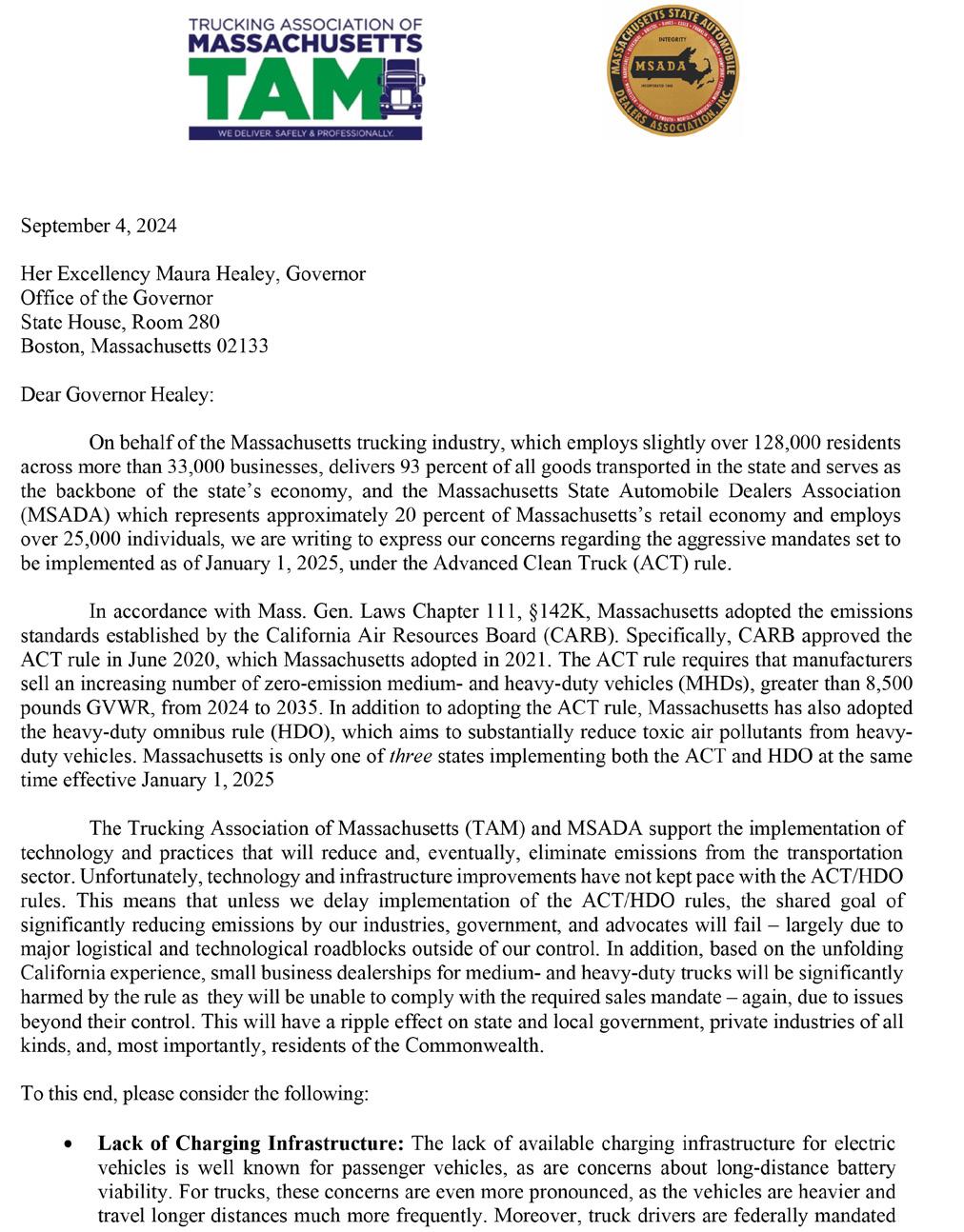
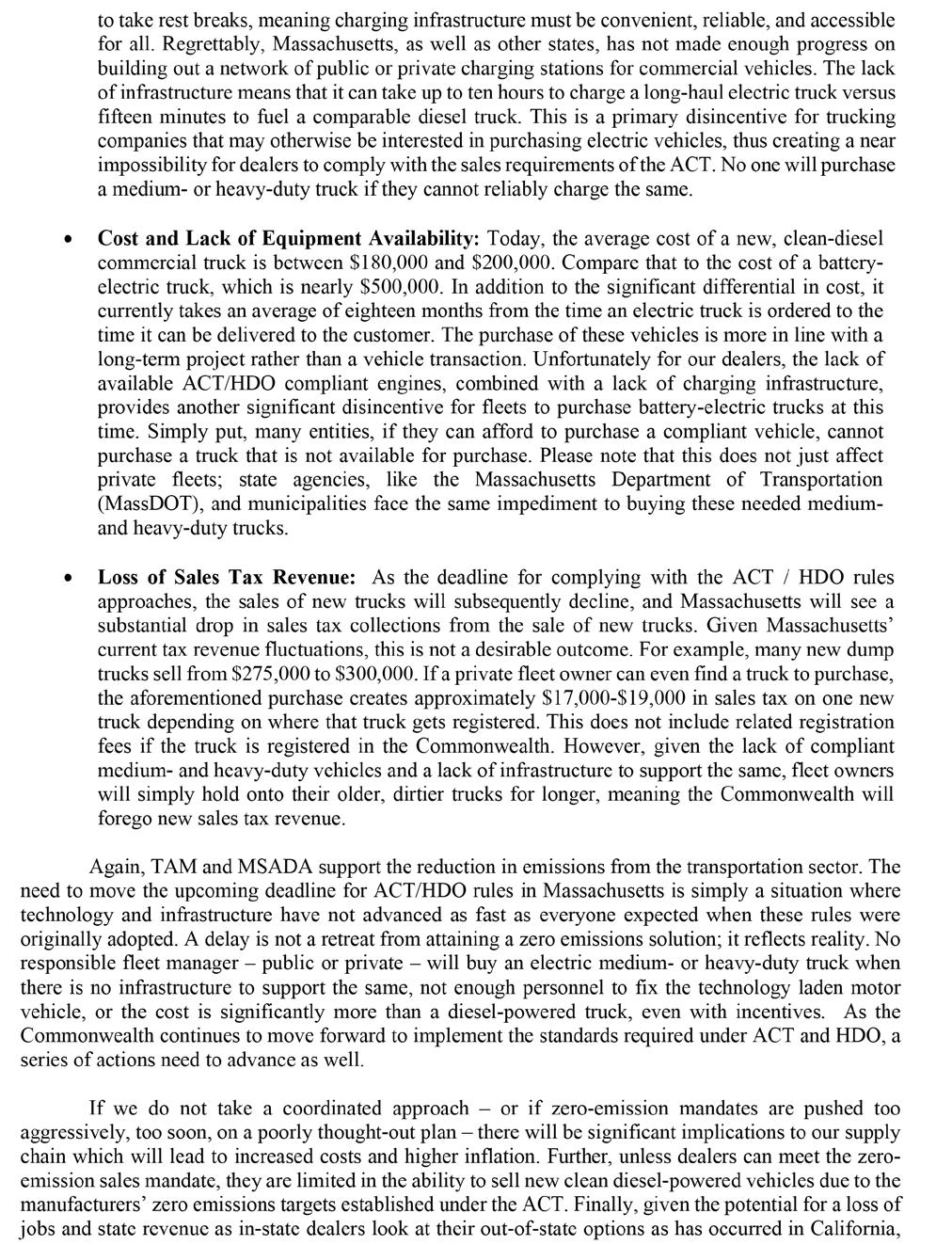
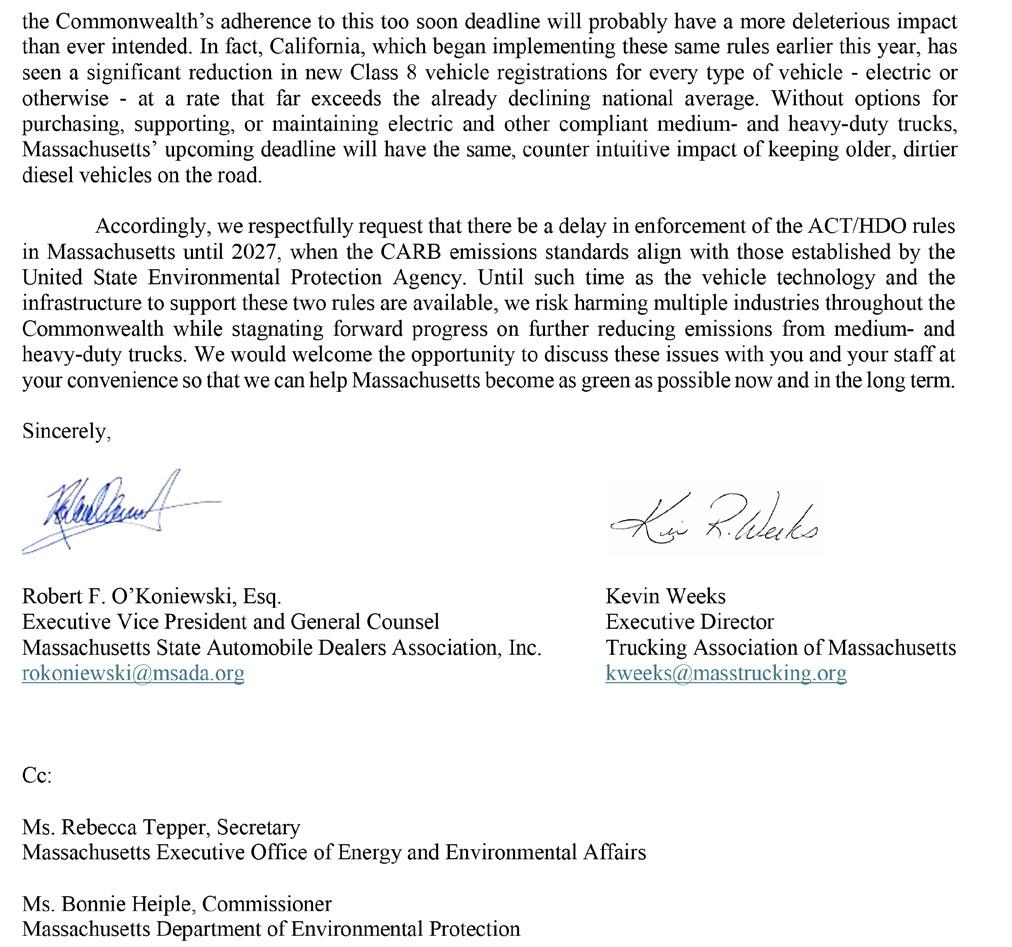
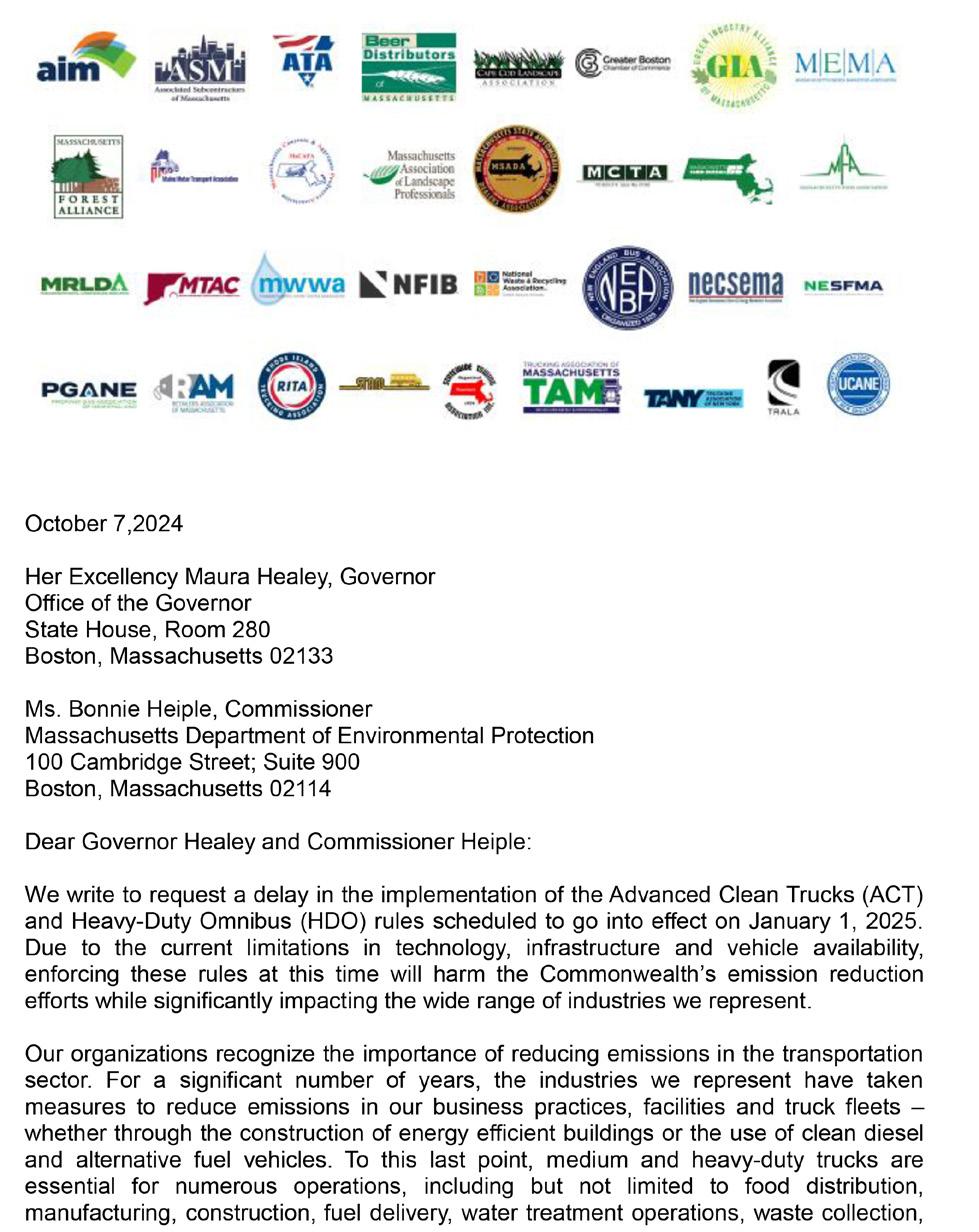
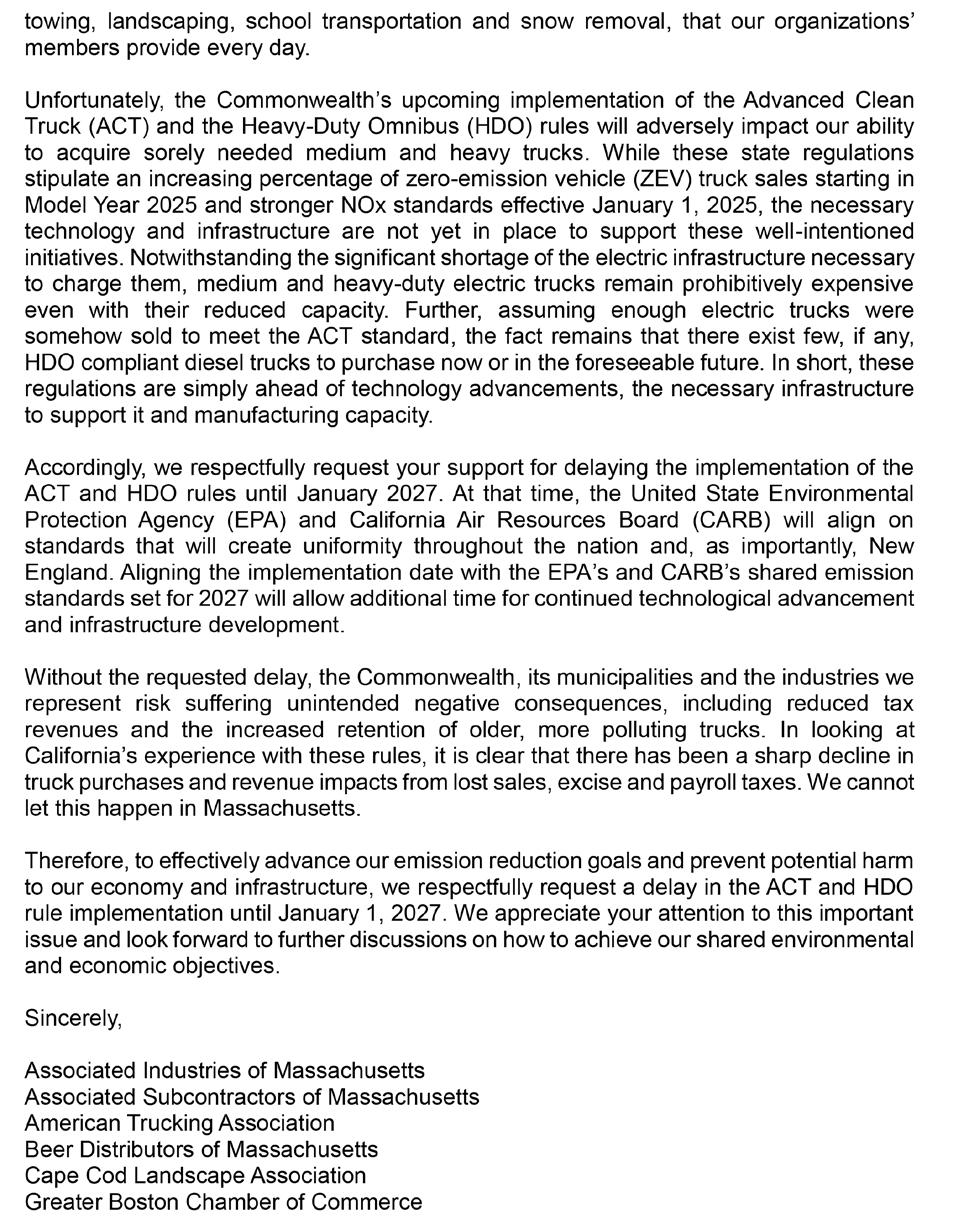
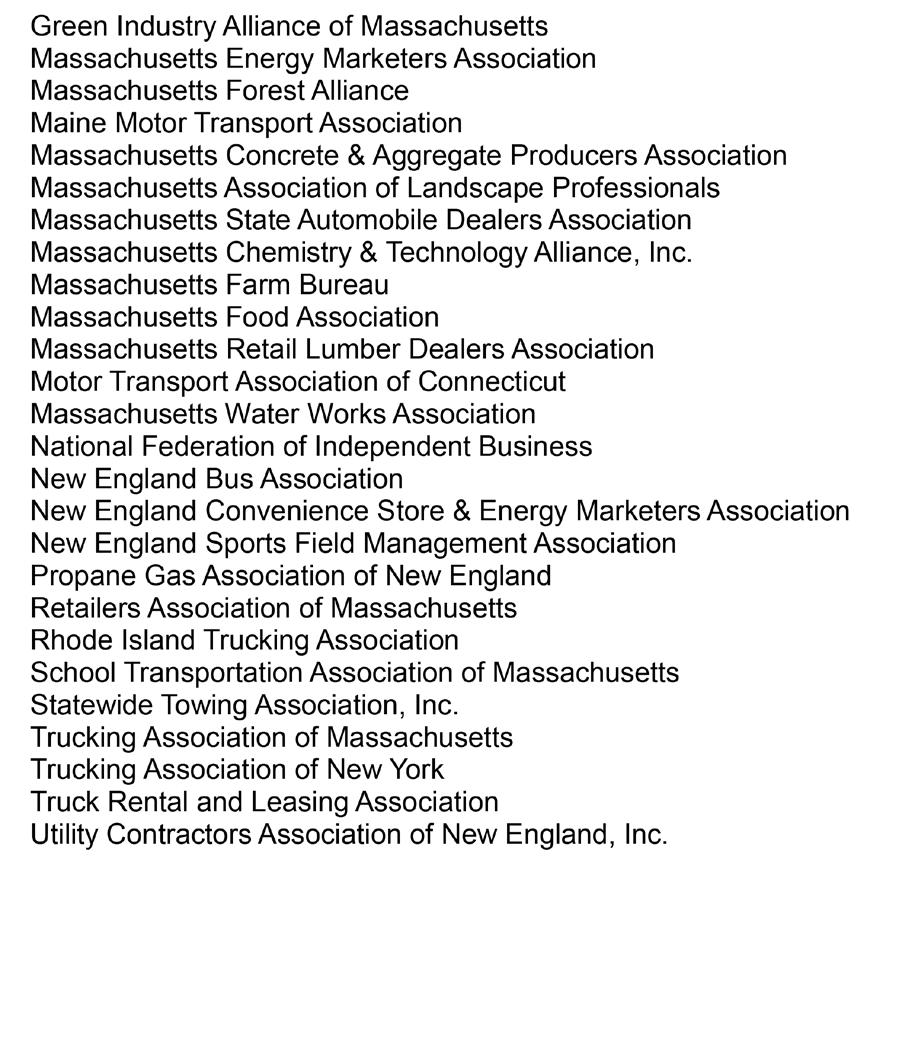
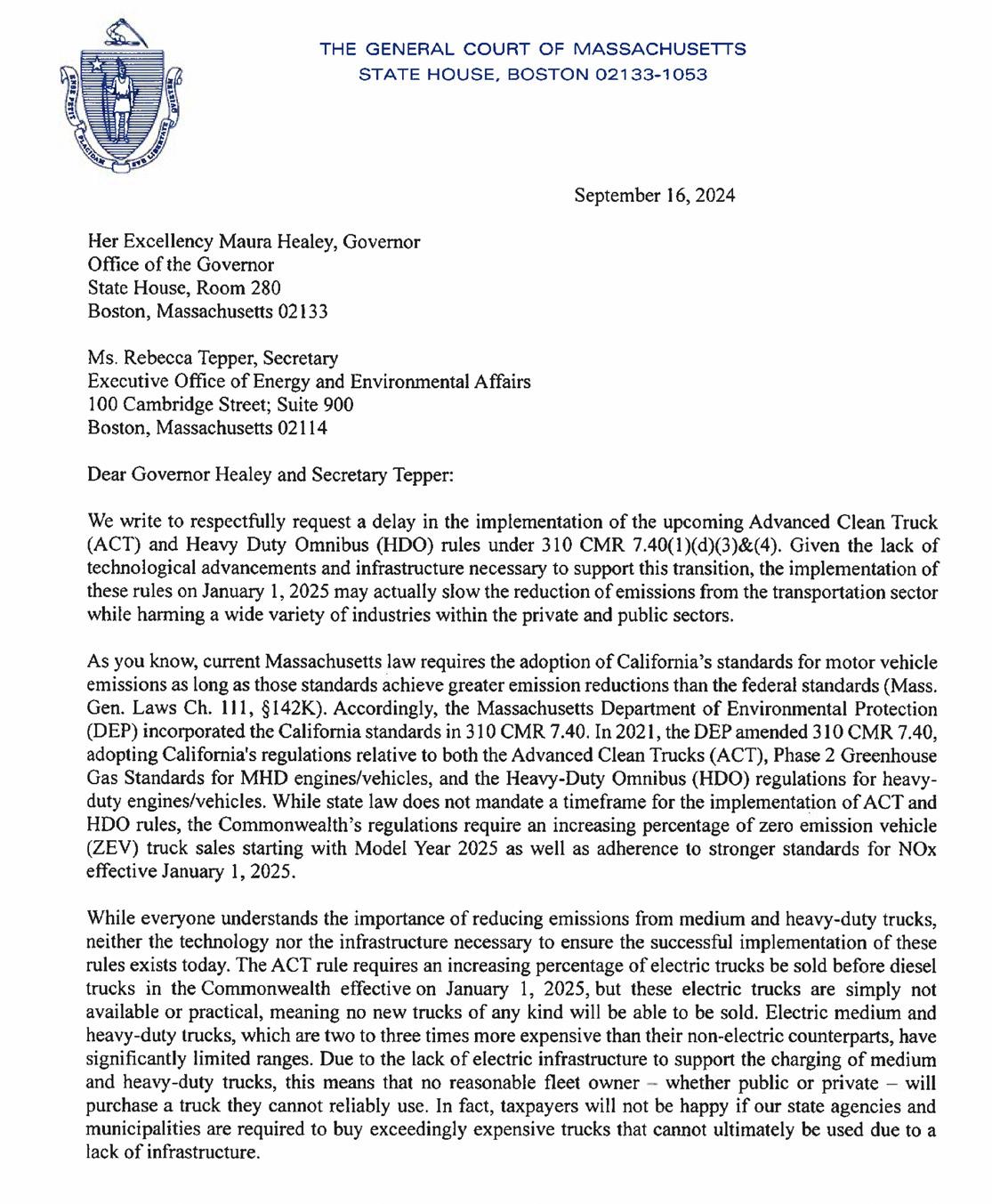

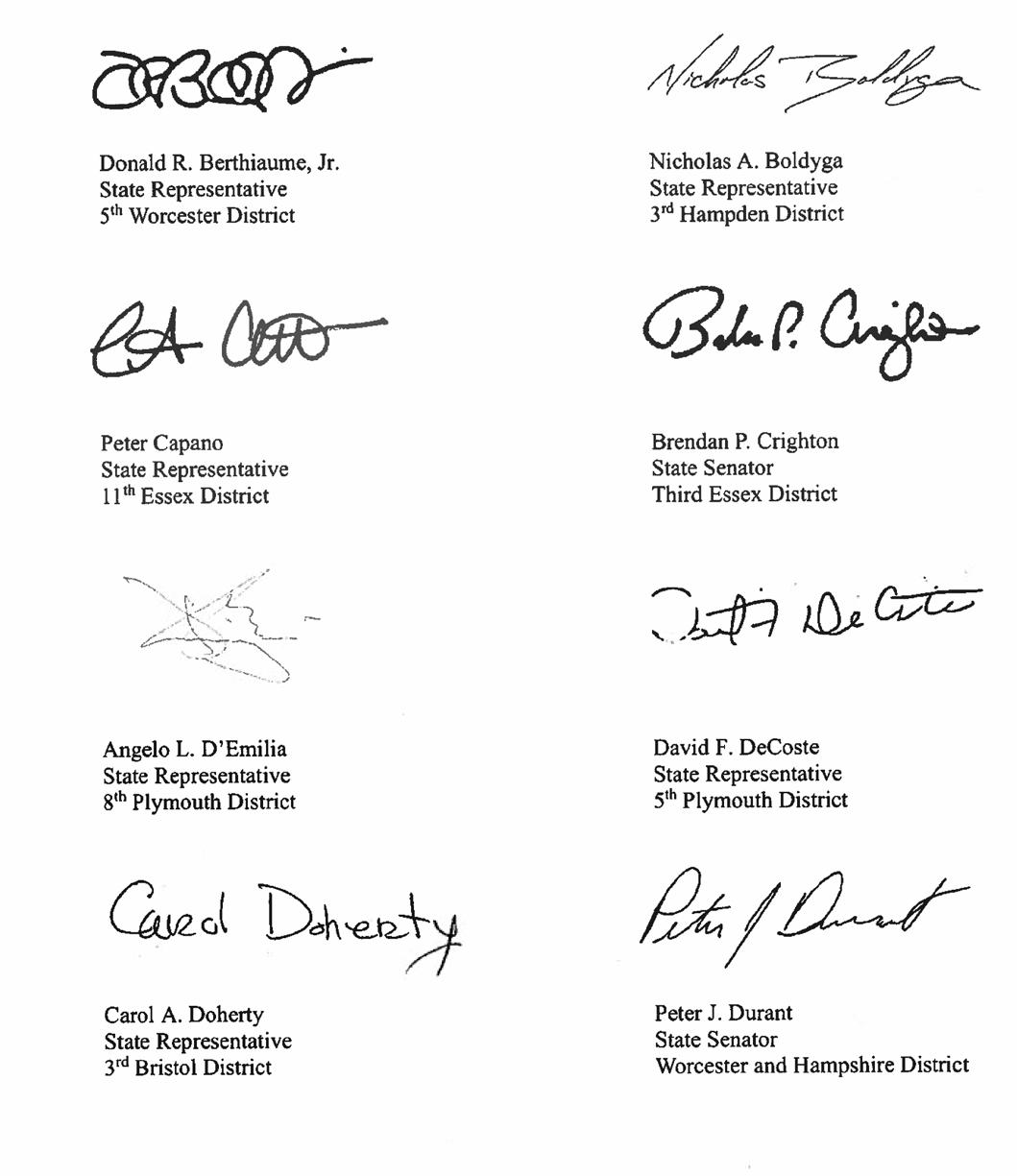
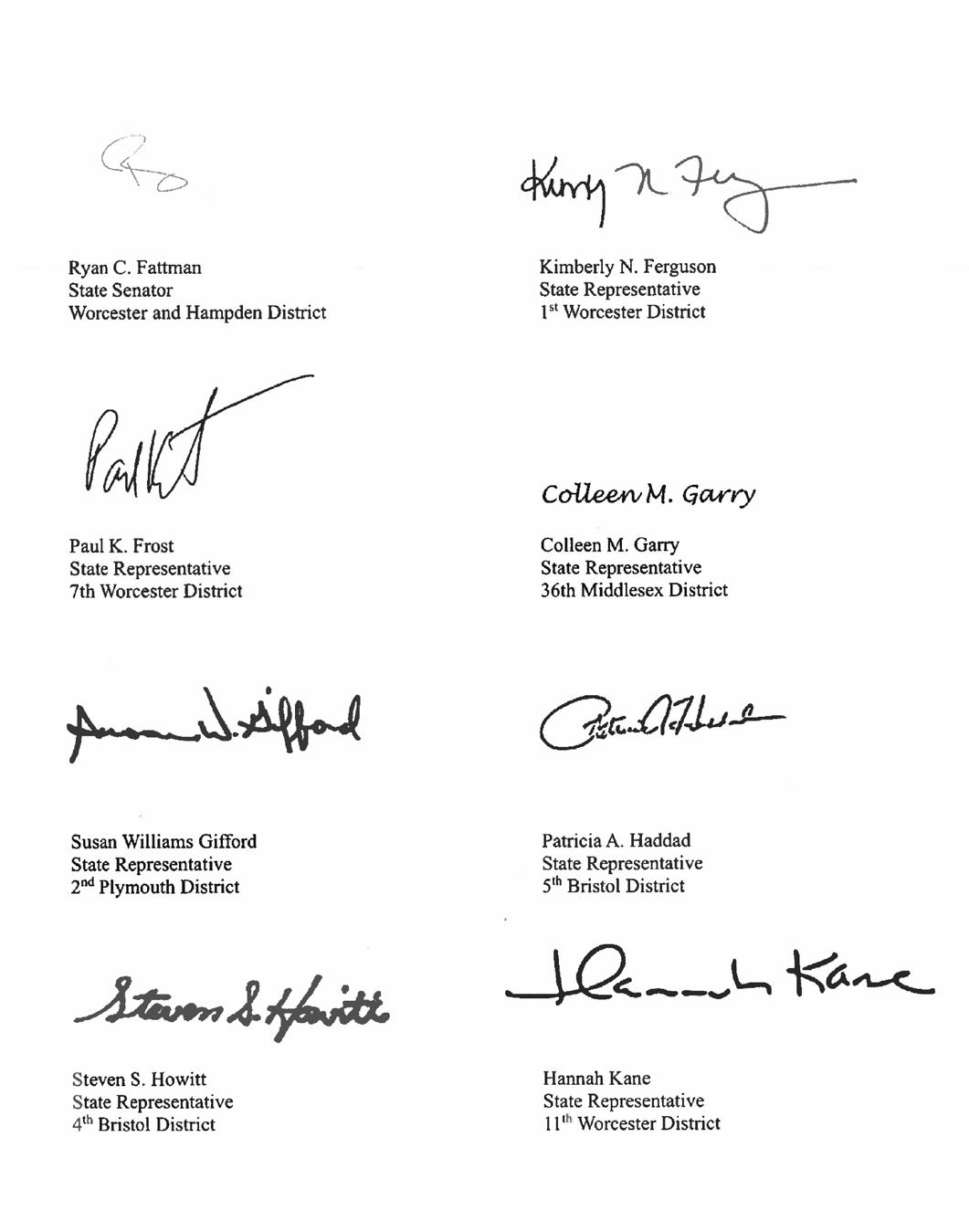
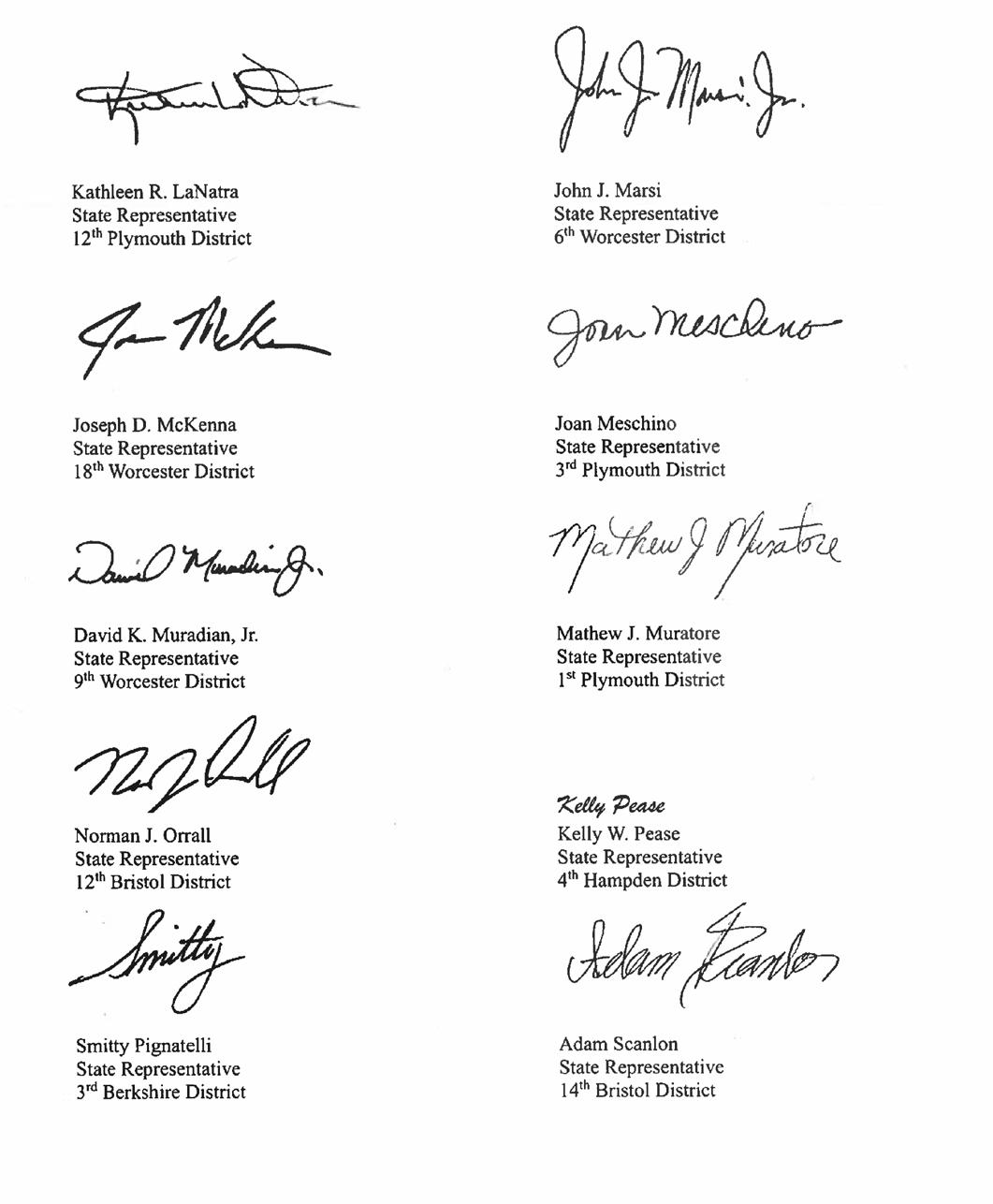
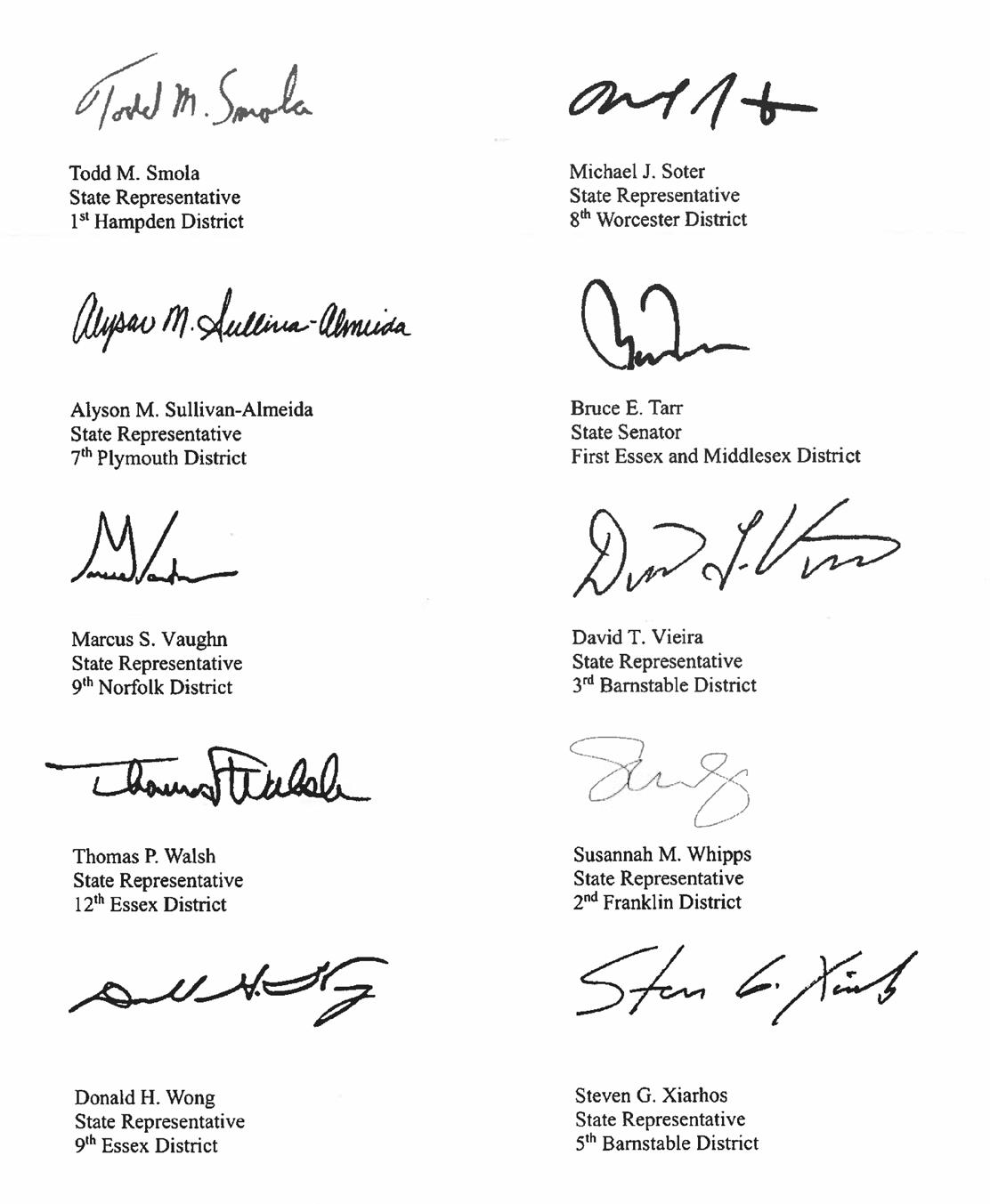
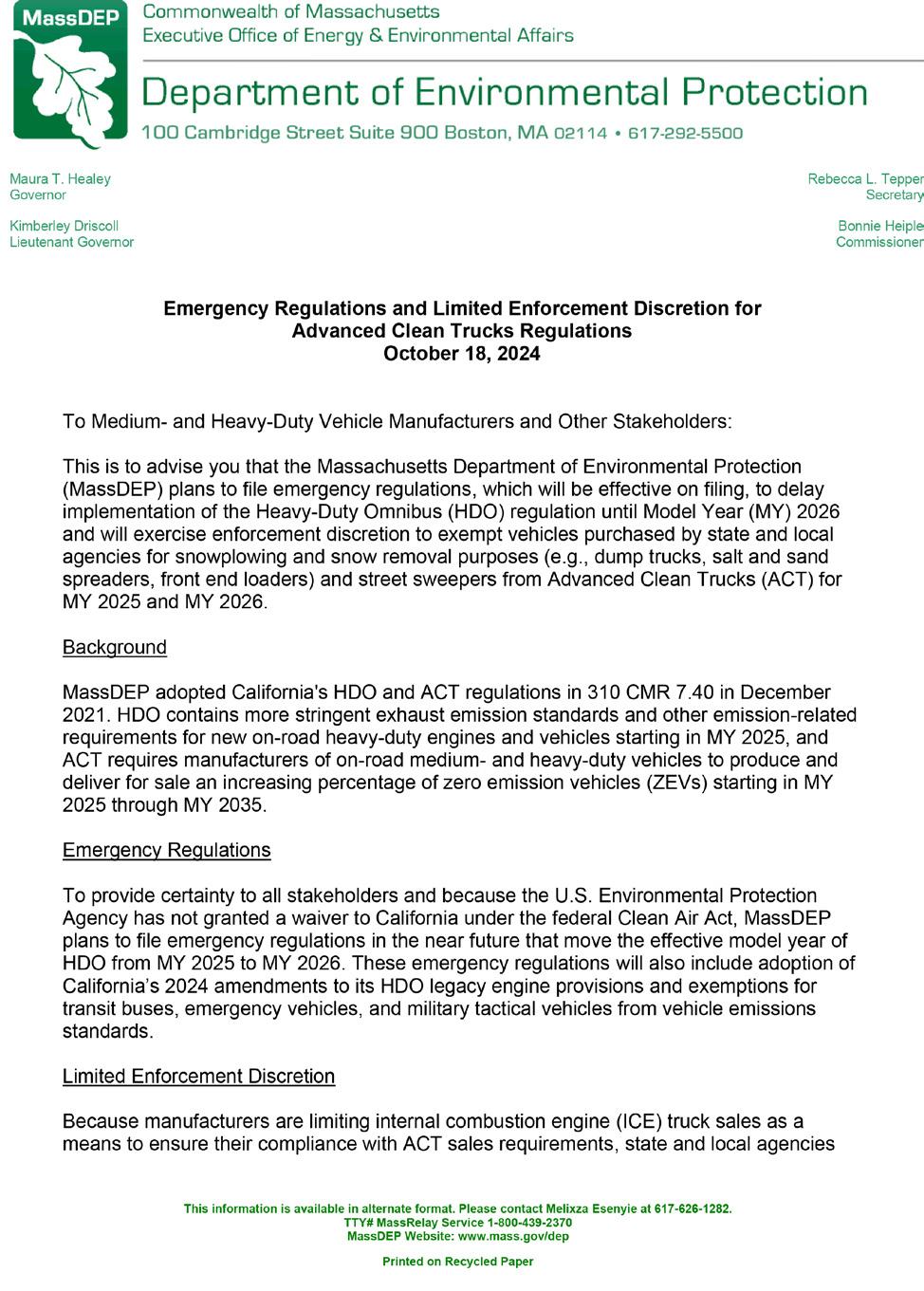

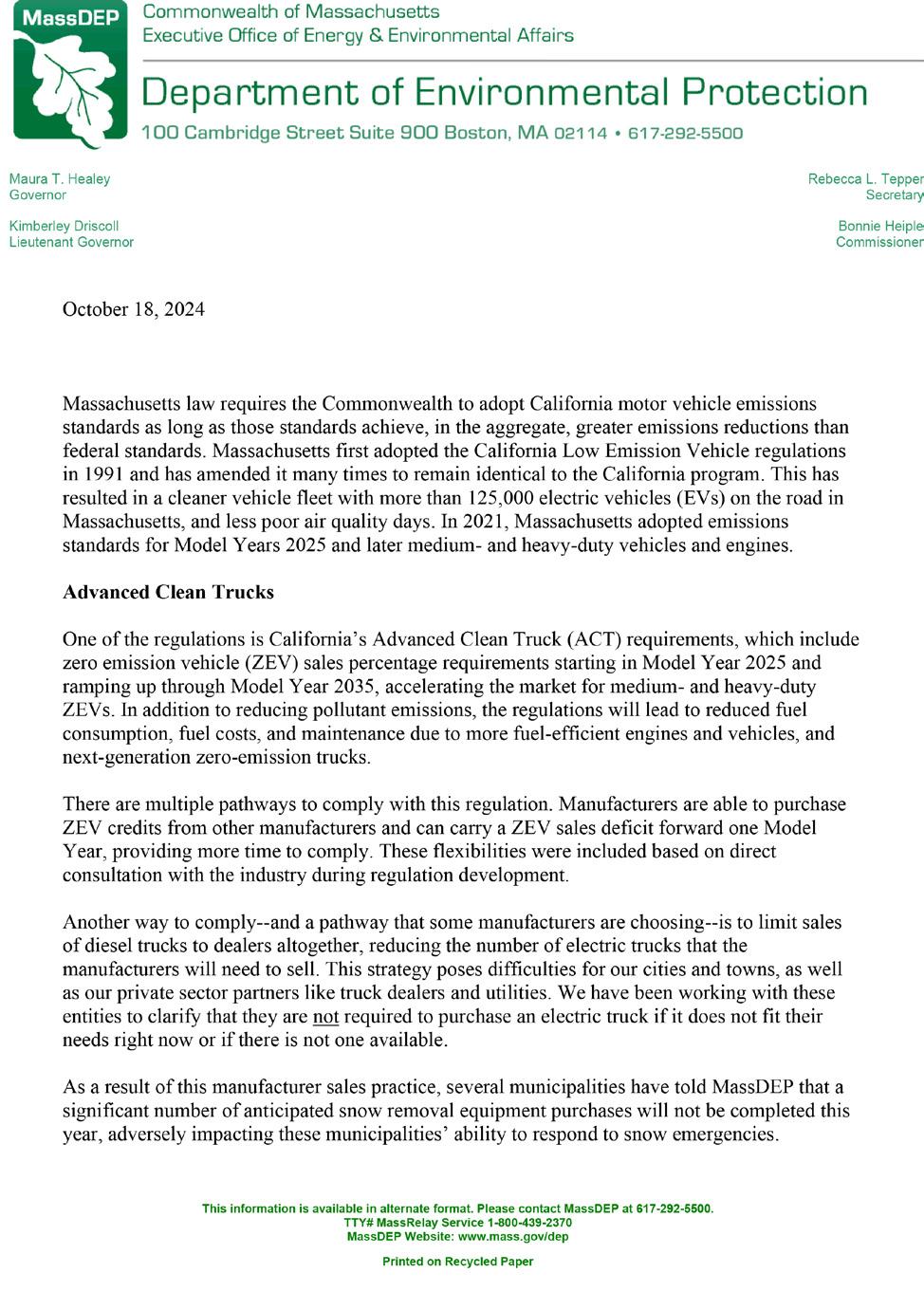


S151
H331
H290
H329
S204
H270
H289
S150
H351
Sen Crighton Rep Hunt
Rep Finn
Rep Howitt
Sen O’Connor
Rep Chan
Rep Finn
Sen Crighton
Rep Lewis
Amendments to Ch. 93B, the auto dealer franchise law.
RTR law amendments to fix Model Year start date and consumer notice.
Creates process to appeal improperly issued Class 1 license.
Modernize on-line vehicle purchase process.
S199 Sen Moore Amends definition of heavy-duty trucks in RTR law.
S220 H400 Sen Velis Rep Walsh Open safety recalls notifications.
H354 Rep Linsky Allows an OEM to open a factoryowned store, without a dealer, if there is no same line-make dealer in the state.
(The so-called “Tesla Exemption.”)


Joint Committee on Consumer Protection held public hearing on July 17, 2023; placed into study.
Joint Committee on Consumer Protection held public hearing on July 17, 2023; placed into extension order.
Joint Committee on Consumer Protection held public hearing on July 17, 2023. H270 reported favorably on Jan. 25, 2024; sent to House Ways and Means.
Joint Committee on Consumer Protection held public hearing on July 17, 2023. H351 reported favorably on Jan. 25, 2024; sent to House Steering & Policy Committee; House ordered to third reading on 2/12/24.
SUPPORT Joint Committee on Consumer Protection held public hearing on July 17, 2023; placed into extension order.
SUPPORT Joint Committee on Consumer Protection held public hearing on July 17, 2023. Redraft H4277 reported favorably on January 25, 2024; sent to House Ways and Means.
OPPOSE Joint Committee on Consumer Protection held public hearing on July 17, 2023; placed into study.
S688
H1095
H1118
S639
H1121
H995
Sen Moore
Rep McMurtry
Rep Philips
Sen Feeney
Rep Puppolo
Rep Donahue
Creates process to increase the insurance reimbursed labor rate paid to auto body repairers.
Protects consumer choice in vehicle service contracts.
S2219 H3255 Sen Cronin Rep Arciero Eliminates initial state inspection for new vehicle.
Joint Committee on Financial Services held public hearing on October 3, 2023; reported redraft H4412 favorably and sent to House Ways and Means.
Joint Committee on Financial Services held public hearing on October 3, 2023; H995 reported favorably and sent to House Steering & Policy Committee.
SUPPORT Joint Committee on Transportation held public hearing on Jan. 24, 2024; placed into study.

H3348 Limit doc prep fee amounts. OPPOSE Joint Committee on Transportation held public hearing on Jan. 24, 2024; reported favorably and sent to House Ways and Means Committee. Rep Howitt
S2210
Sen Crighton
Sen Creem Rep Carey

Safety shutoff for keyless ignition technology.
Joint Committee on Transportation held public hearing on October 17, 2023; reported favorably.
S25 H60 Personal data privacy and security. OPPOSE Joint Committee on Advanced Information Technology, the Internet and Cybersecurity held public hearing on October 19, 2023. On 5/13/24, Committee reported redrafts S2770 and H4632 favorably; each sent to respective Ways and Means committee.
S227 Sen Finegold Mass. Info Privacy & Security Act. OPPOSE Joint Committee on Economic Development and Emerging Technologies held public hearing on October 19, 2023. Bill sent to AITIC Committee on November 2, 2023.
S171 H311 Sen Feeney Rep Gonzalez Protect consumers in auto transactions. OPPOSE Joint Committee on Consumer Protection held public hearing on July 17, 2023; reported S171 favorably on 1/25/24 and referred to Senate Ways and Means. SWM reported redraft S2736 favorably on 4/22/24. Senate engrossed on 4/25/24.

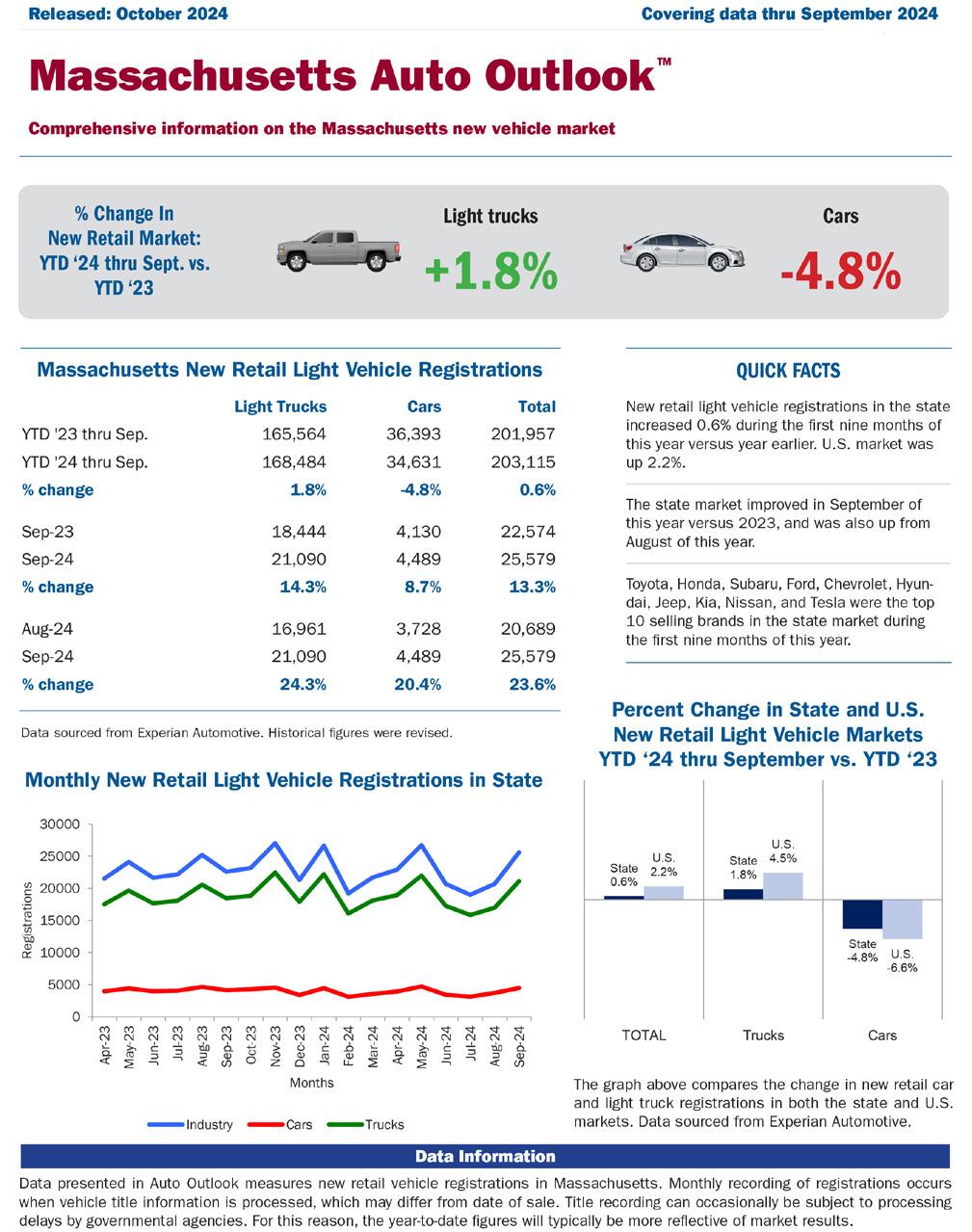
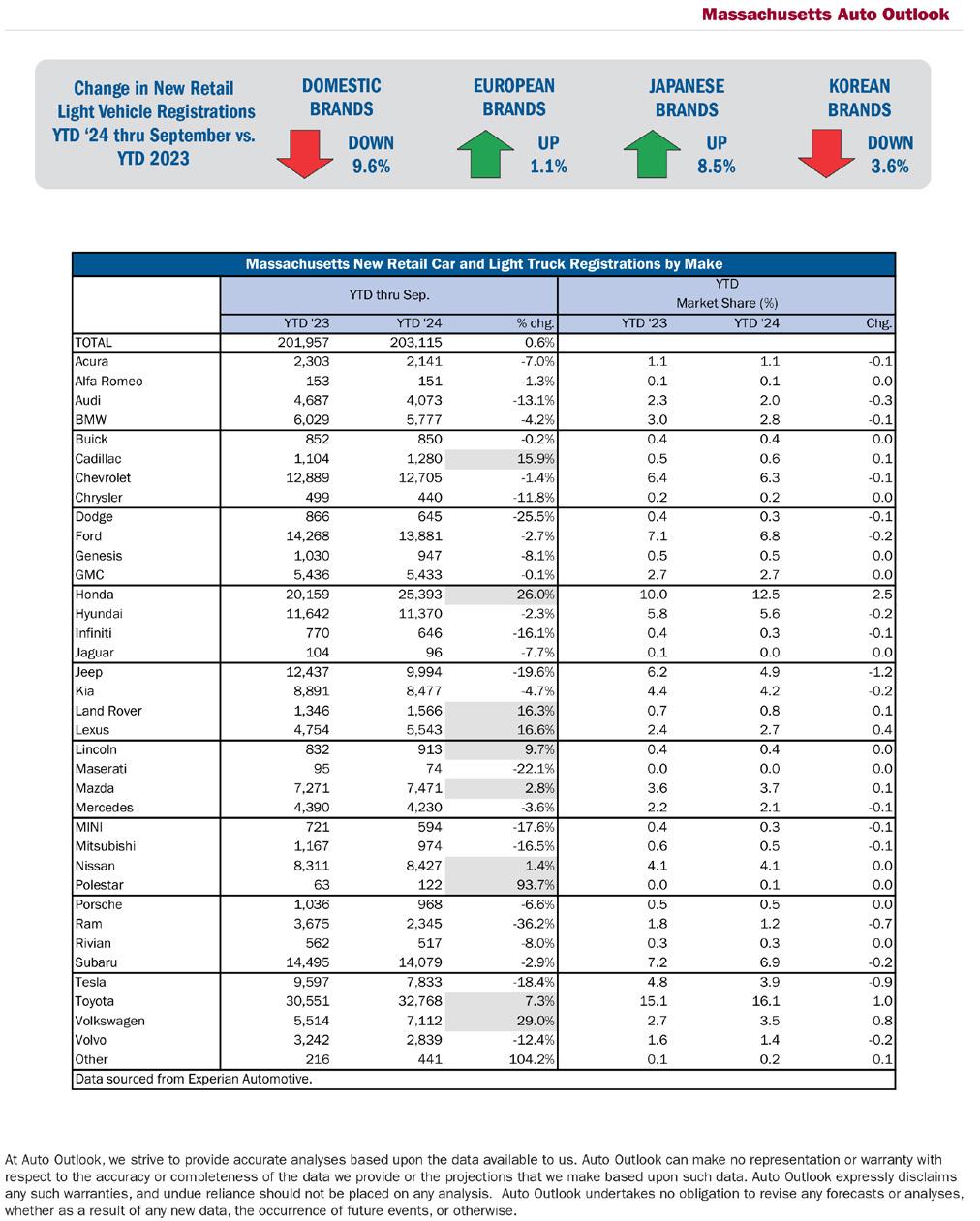

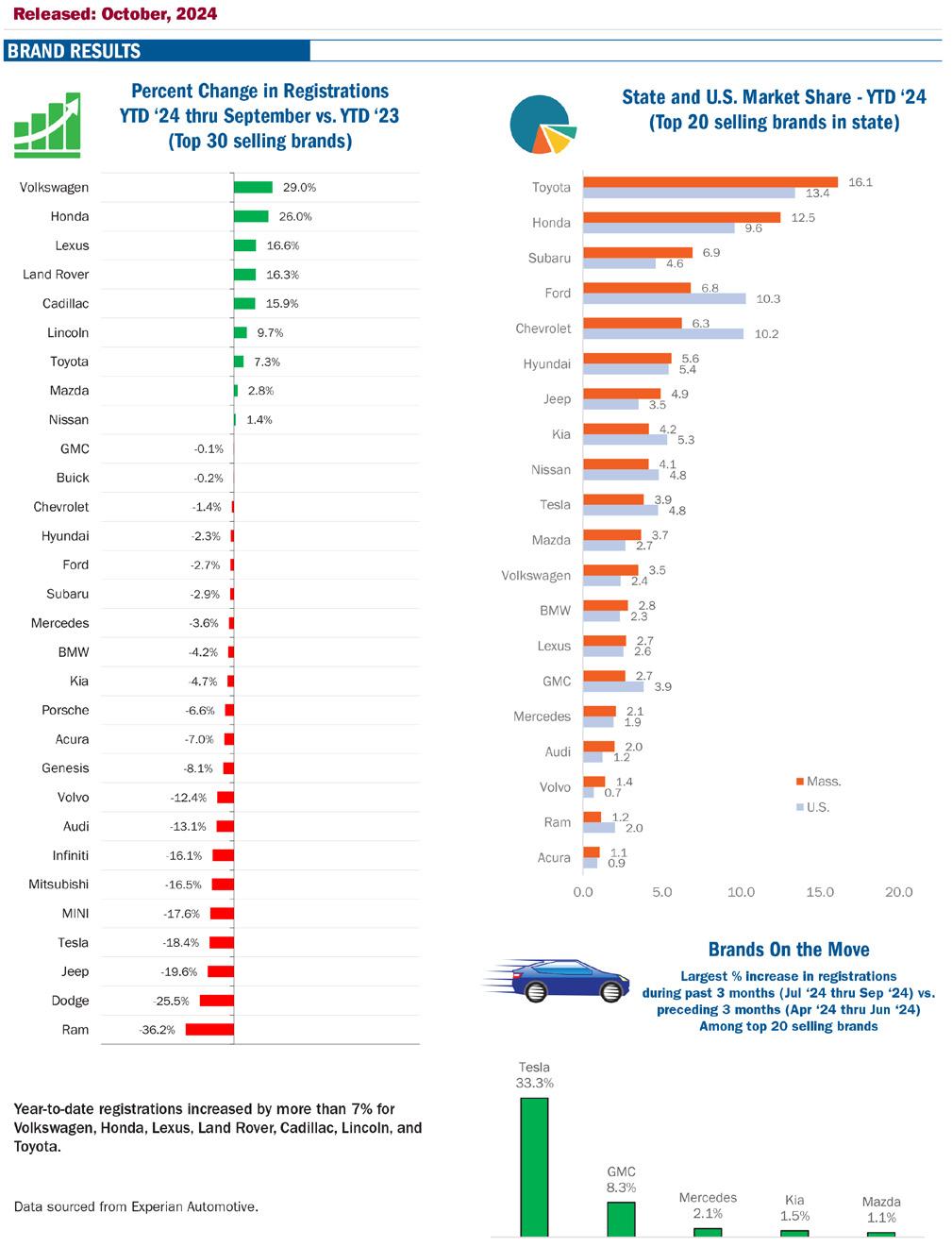
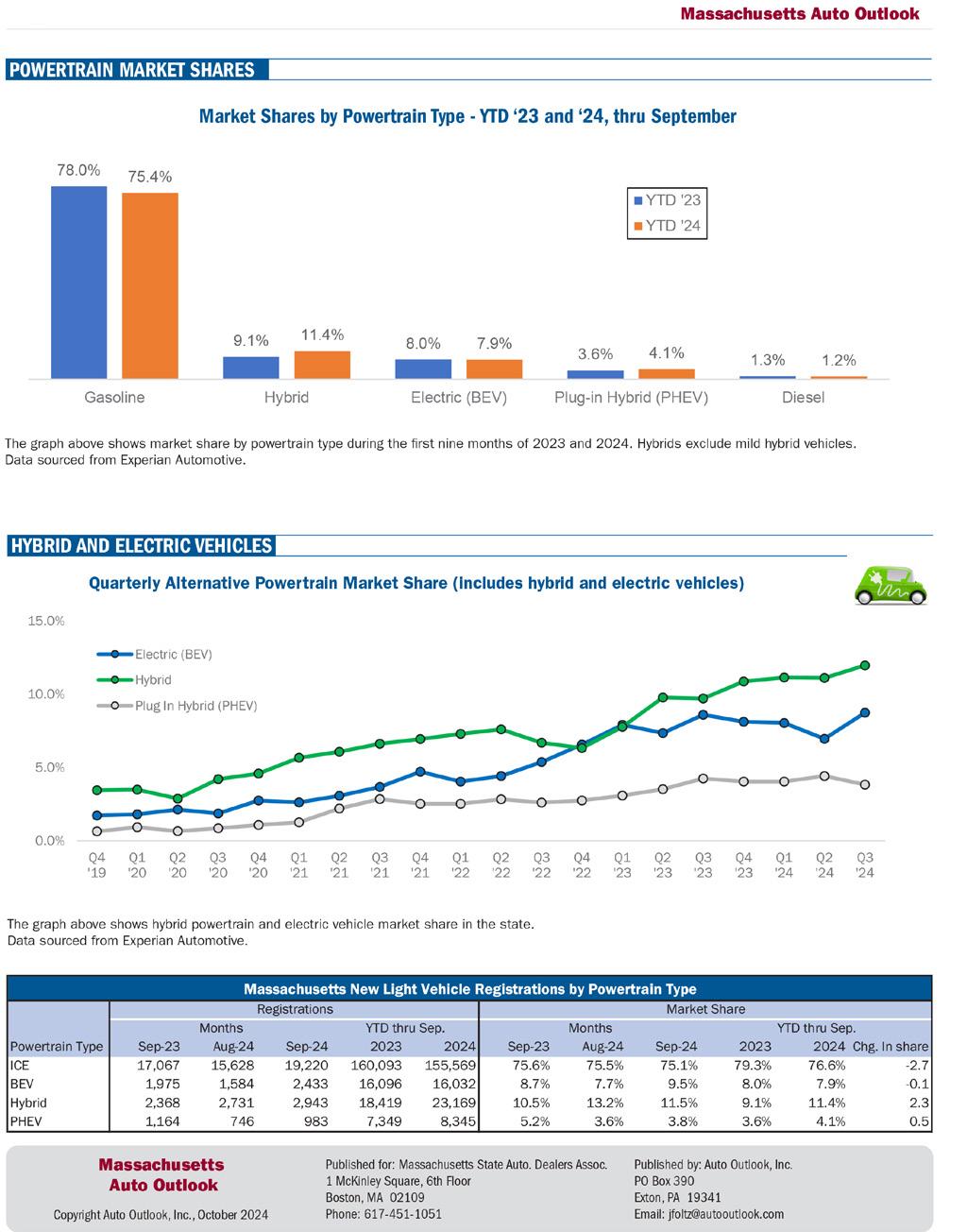
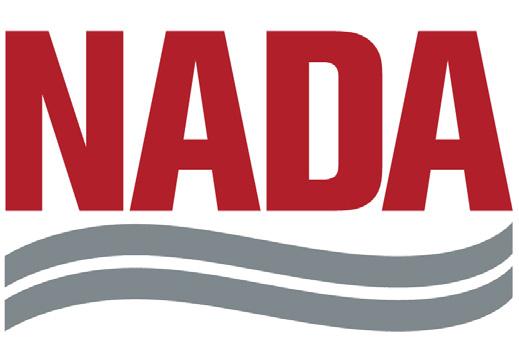
WHENEVER there is something to talk about that affects the entire nation, people find the best place to gather is in a place where their voice is best heard. Typically, that place is close to the seat of the federal government. For a few days in September, it was auto dealers that came to gather in Washington, D.C. to discuss the state of the industry and chart a path forward at NADA’s 49th annual Washington Conference and Congressional fly-in.
More than 400 NADA members and state dealer associations’ staff gathered at the Capital Hilton for the conference on September 16-18. The event also included Capitol Hill visits and a welcome reception at the Smithsonian’s Natural History Museum.
Chris Connolly has been attending the conference for over a decade, making sure the Members of Congress receive the dealers’ side of each pertinent issue. The importance of dealer input on public policy matters can never be underplayed.
“I have been to the Washington Conference with NADA year after year because it helps protect our biggest investment – our business and our employees,” Connolly said. “The easiest vote these people will make in a session are the ones that no one talks with them about. We have to meet with our delegation and talk to them about the issues that affect our dealerships and what it means for our employees.”
NADA kicked off the conference with the sole focus on Next Gen dealers, beginning with an evening reception on Monday, September 16, followed by a full slate of speakers and policy briefings on Tuesday morning, which focused on getting young, new attendees up-to-speed on NADA’s legislative priorities. After NADA’s legislative affairs team instructed the group of NextGen attendees on how to be successful advocates for the retail auto and truck industry, attendees put their new skills to the test by holding mock Congressional meetings.
“I was there, once again, as part of NADA’s Next Gen program which is specifically for aspiring dealers under 40,” said Bouchard of the Ron Bouchard Auto Stores, who was attending his fourth conference. “It was exciting to see both new and familiar faces at
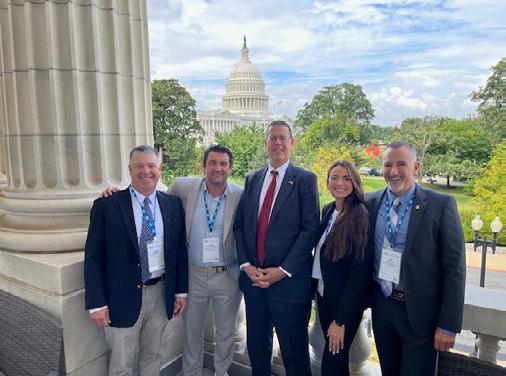
This year our Massachusetts dealers were represented on Capitol Hill by MSADA Immediate Past President Chris Connolly; dealer Ray Butler; Next Gen dealers Chad Bouchard, Ruddy Brito, Richie and Vincent Mastria, and Brianna Butler, Ray’s daughter; and MSADA Executive Vice President and General Counsel Robert F. O’Koniewski.

this year’s Washington Conference. It felt like the combination of experience and new ideas from the dealer body made an impact on all of the legislators and their assistants as we continued to talk about ongoing issues as well as new headwinds in the political world that continue to make the automotive world for both dealers and their customers more difficult.”
“One of the biggest takeaways this time around was how much Washington overlooks the real-world impact of policies, especially when it comes to the automotive industry.”
This was the second consecutive year for Ruddy Brito, CEO of the Mastria Auto Group, who was also part of MSADA’s efforts to have next generation dealers more involved in these lobbying efforts.
Ruddy Brito CEO, Mastria Auto Group
“One of the biggest takeaways this time around was how much Washington overlooks the real-world impact of policies, especially when it comes to the automotive industry,” Brito stated. “The FTC’s Vehicle Shopping Rule, for instance, was pushed through without undergoing the mandatory rule-making process. These rules will add $24 billion in costs over the next 10 years, and none of us—dealers or consumers—were part of the conversation.”
“This highlights why it’s crucial for more dealers to get involved and tell their stories. Our customers deserve better, and we have to be part of the solution by making sure our voices are heard,” Brito continued. “There’s nothing like sitting face-to-face with lawmakers to share how these policies affect our businesses and the people we serve.”
NADA, as part of the festivities, always does an excellent job bringing in speakers to provide a full flavor of what is going on in the extremely insular world of D.C. politics. In order to set aside more time to visit the federal legislators at the Capitol, NADA this year streamlined its speaking program. This year’s crop of speakers included Rep. Cathy McMorris Rodgers (R-Washington), the chair of the House Energy and Commerce Committee; David Wasserman, senior election analyst for the Cook Political Report; and legislative briefings from NADA staff.
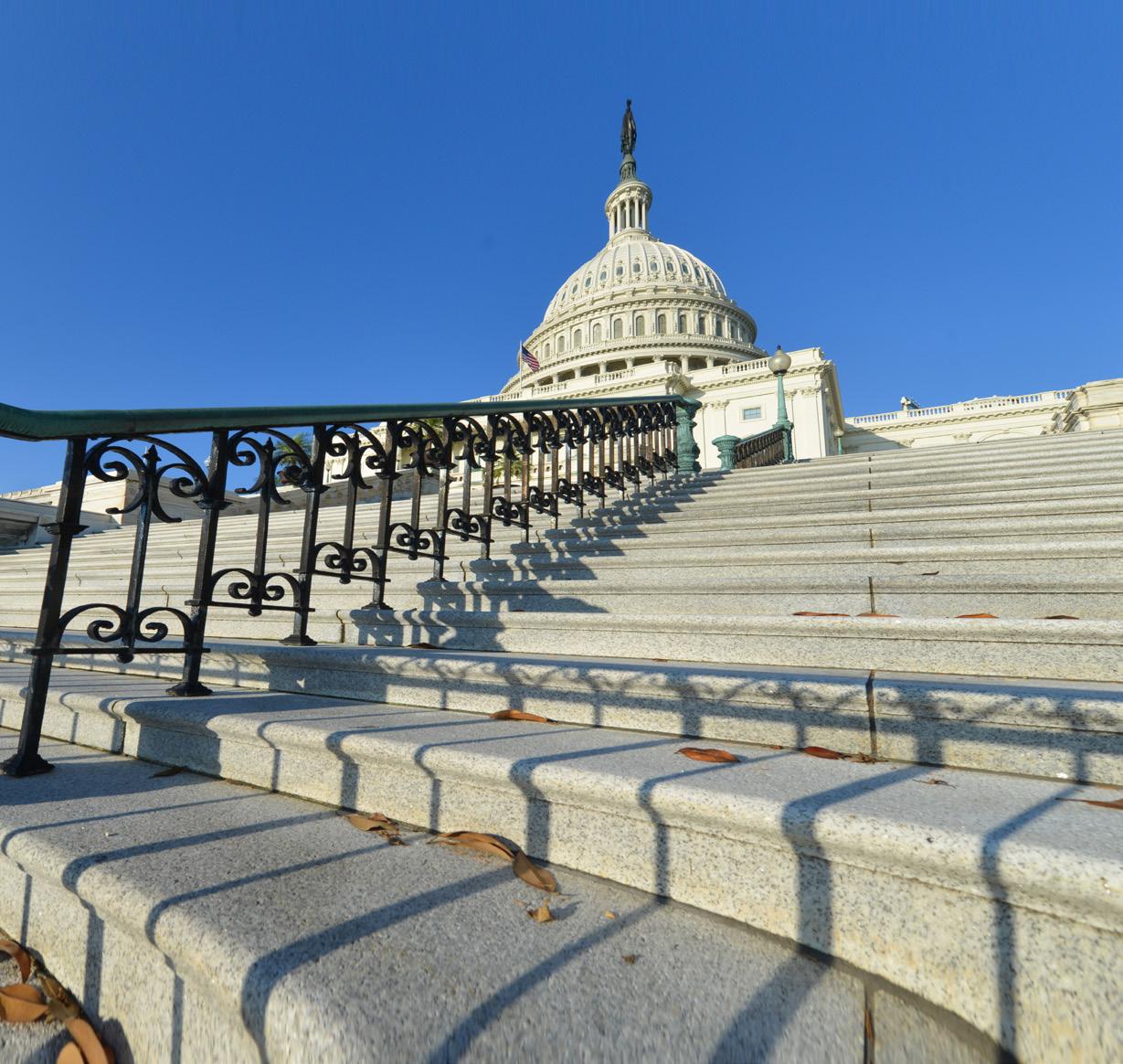
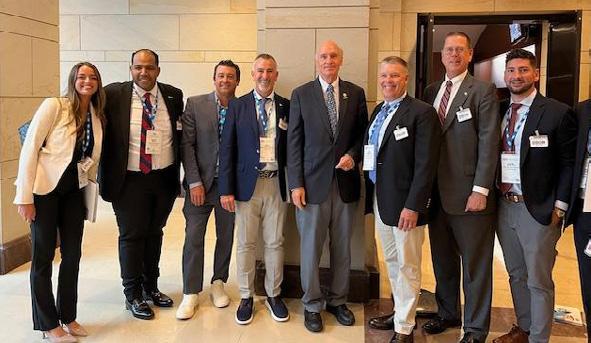
The key issues dealers focused on this year – as highlighted in last month’s Massachusetts Auto Dealer magazine – were Congressional efforts to defund the Federal Trade Commission’s Vehicle Shopping Rule; overturning the EPA’s new emission rules for cars and light-duty trucks with their de facto EV mandate; supporting passage of a bill to address catalytic converter thefts; and opposing so-called “right to repair” legislation.
Once the speeches and briefings were over, dealers were ready to spread the message on Capitol Hill. During MSADA’s two days of meetings in D.C., they met with Rep. William Keating (D-Bourne) and staff members for Reps. Lori Trahan (D-Westford), Jake Auchincloss (D-Newton), Jim McGovern (D-Worcester), Stephen Lynch (D-South Boston), Katherine Clark (D-Melrose), Seth Moulton (D-Salem), and Richard Neal (D-Springfield), and Sen. Ed Markey (D).
ly had not been exposed to the legislative machinations in Washington until this year’s conference.
“It was all very exhilarating being in our nation’s capital and being able to express our opinions and views on upcoming bills and legislative votes that will impact the automobile industry,” Ray Butler commented. “Being able to introduce my daughter, who is my successor, to the process and opportunities we have as dealers is of the utmost importance. I am hoping my daughter will be a big part of our efforts in the future years to come.”
Ray’s daughter, Brianna, certainly brought an invaluable and unique perspective to the group and the legislative meetings.
“This was my first experience lobbying at the Capitol advocating for the automotive industry. It was an eye-opening, invaluable, powerful experience,” Brianna Butler stated. “It has left me inspired and even more committed to being part of our industry’s advocacy efforts. Especially being a woman in the industry, I’ve always believed in the importance of being a voice for the automotive industry. NextGen is very important to me, and it was great to meet new people and see my fellow NADA Academy Alumni enthusiastically being part of this process as the future voices for our industry.”
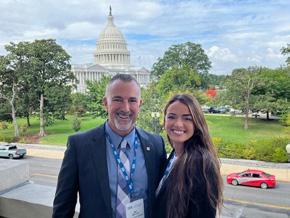
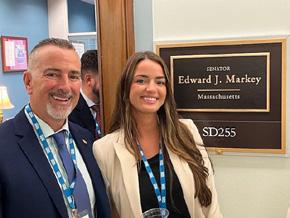
The November election will determine which parties will control the White House and the two chambers of Congress. As the nation looks ahead to see how and who will be confronting such matters as the economy, immigration, and foreign affairs, those in dealer world cannot rest –NADA, MSADA, and other state dealer associations must remain on top of the activities in Washington.
First-time attendees, and Next Gen members, Richie and Vinnie Mastria, enjoyed the chance to be part of a process everyone hears about but not many take advantage of.
“This was my first experience lobbying at the Capitol advocating for the automotive industry. It has left me inspired and even more committed to being part of our industry’s advocacy effort, especially being a woman in the industry.”
“Attending the conference this year was a real eye-opener. It made me realize just how vital our voice is in shaping policies,” Richie said. “Experiencing the process first-hand revealed that, while many laws are written with good intentions, they often have unintended consequences that impact both customers and dealers negatively.”
–Brianna Butler
Vincent concurred with his brother. “That’s why it’s crucial to speak up, share our insights, and work together to protect the interests of our customers and businesses, striving toward a common goal—delivering the most efficient and customer-focused experience possible,” he said.
Ray Butler, an established dealer in Worcester County, previous-
“A substantial part of what MSADA does for our members is to stay in touch with our U.S. senators and representatives so that they know that what they are doing, or not doing, has an impact back home at our members’ dealerships,” said MSADA Executive Vice President Robert O’Koniewski. “We can never stop putting effort into making sure our representatives know who we are, what we do, and how vital our contribution is to their districts and our communities. Our engagement cannot be sporadic. Building relationships through constant communications can help to move policies in certain directions at times. Vigilance, education, and dealers’ active participation are pillars in our lobbying efforts throughout the year.”
As government becomes more involved in the auto industry, the future of dealers’ advocacy is in good hands with Massachusetts’s Next Gen dealers.

ADAMS
The Berkshire Eagle
Haddad Auto Group has purchased the two remaining GMC dealerships in Berkshire County and, at the direction of the automaker, will operate only one of those locations while offering the employees of both businesses jobs within the organization.
In the transaction, Haddad Auto Group purchased McAndrews-King GMC in Adams and Berkshire GMC in Sheffield.
McAndrews-King GMC, now Haddad GMC, will stay open with all of its employees. Berkshire GMC in Sheffield has closed its doors, and its nine employees have switched to jobs at either one of Haddad’s four franchise locations in Berkshire County or other dealerships and repair shops.
“It was part of the agreement with GMC that I buy both [dealerships] because they only want to have one dealership in the county,” President and CEO of Haddad Auto Group George Haddad said.
To Haddad, adding domestically-manufactured GMC vehicles to his existing portfolio of all foreign-made brands — Hyundai, Subaru, and Toyota — makes sense. GMC makes heavier duty trucks than his current franchises, which Haddad says are in demand.

“We’ve got a lot of customers who want those, so it’s a natural fit,” he said.
Haddad chose to keep the northern location open over the southern location because it has more space and a full showroom.
“General Motors was fine with staying here because it was a full dealership,” he said. “The one in Sheffield, they [were] working out of a trailer.”
For Berkshire GMC, the decision to sell came at a time its owner, Brian Palmer, had decided to retire from the business, while McAndrews-King President Dan Maloney saw a sale as a way to keep the dealership open under new ownership.
Haddad, Maloney, and Palmer signed the deal on July 31 and Maloney started answering the phone with “Haddad GMC” the next day.
After 50 years answering the phone as “McAndrews-King,” the change will be hard to get used to, Maloney said. But he felt comfortable moving forward with the deal.
“The more time I spent with George Haddad, it started to seem like a comfortable fit for everyone,” Maloney said.
Haddad said that his company offered employment at Haddad franchises to “pretty much everyone” who worked at Berkshire GMC. “Some of them took it, and some of them didn’t,” he said.
Brian Palmer took over the franchise from his father in 1996, 22 years after it first opened. The dealership already faced closing in 2009 when General Motors declared bankruptcy. Back then, GMC wanted to consolidate to one dealership in Berkshire County, but the Palmers convinced GMC to let them stay, Haddad said.
After nearly half a century in business, Palmer was satisfied closing his store location.
“I had reached retirement age, and I thought it was time to move on with my life,” Palmer said. “I would like to thank all our loyal customers over the years for their patronage and their friendship.”
Palmer anticipates that the store location in Sheffield will be leased or sold.
For Maloney, making the sale was a way to keep the McAndrews-King dealership and its 23 employees intact. The dealership dates back to 1973, when Rick King and Owen McAndrews came together when King was only 28 years old to open McAndrews-King Pontiac-Buick.
Of the dealership’s 51 years, Maloney has been around for 50. He walked into the store at 19 years old, looking for a job, and Larry Choquette, the then-service manager, took a chance on Maloney. Four years later Maloney became the service manager.
“It’s been an incredible dealership and I’ve just so thrilled that I’ve had a job that is something I’ve enjoyed doing for all these years,” he said.
Maloney doesn’t have a child interested in taking over the business — his daughters are happy with their non-auto industry careers. He wasn’t sure where the business would go after him, but he knew he didn’t want to sell to just anyone.
“I wanted someone who was a local buyer who understands Berkshire County,” he said. “Having somebody who knows the community and has name recognition seemed like a nice fit for everyone.”
Maloney will continue to work at the dealership under Haddad’s ownership.
“I’m not ready to retire and I’m still very happy working,” he said. “There’s a small group of people here, and they are like family to us.”
Haddad does not plan on making any major changes to how the former McAndrews-King GMC operates, but he does plan to advertise more and put out more inventory from the manufacturer on the lot.
“They’ve got a great reputation, and I just want to expand on it,” he said.
Haddad noted that, with the exception of Toyota, all other car brands in the county have only one dealership location.
Audi Norwell, part of Ray Ciccolo’s Village Automotive Group, recently achieved Audi Magna Society Elite status for 2023, Audi of America’s highest level of dealership recognition. Audi Norwell has earned Magna Society status every year since 2017; however, this is the third time since 2018 that Elite status has been achieved by the dealership, a special honor for superior achievement as the best of the best.
Audi of America Area Sales Manager Jorgen Weikert and Audi of America Area Director Rick Fuller recently paid a visit to Audi Norwell to congratulate Owner and President of Village Automotive Group Ray Ciccolo along with Audi Norwell General Manager Michael Gaughran on their accomplishment of once again earning the Audi Magna Elite Award for 2023.
“I am extremely proud of our team at Audi Norwell for receiving this prestigious honor from Audi of America for a third time,” said Ciccolo. “This honor is a testament to the team’s commitment to excellence and customer satisfaction, which is a top priority throughout Village Automotive Group.”
Audi Magna Society Elite status is awarded to Audi Dealers who have outperformed their competition, exceeding customers’ expectations, and attaining the highest level of overall business performance. Each year 17 dealers across the country receive Elite status, which is based on accomplishing objectives set by Audi of America based on performance and customer satisfaction. Audi Norwell was recognized for its ability to go the extra mile in ensuring customer satisfaction and reflects a true understanding of the Audi brand and collective mission.
“This honor is truly a team achievement,” said Gaughran. “The award recognizes dealerships that display continuity throughout the operation and to achieve Elite Status in three of the last five years shows the experience and commitment the Audi Norwell team has to always surpass the expectations of our customers.”
More than 5,000 dealerships across the U.S. recently signed an open letter urging federal and state officials to relax emissions regulations and electric vehicle mandates. The dealerships are concerned about the EPA’s emissions rules
and certain states’ EV sales requirements. The flattening of EV sales growth has left the vehicles piling up on their lots, they wrote. If officials do not adjust the regulations, customers could end up competing for a smaller inventory of gasoline-powered vehicles, the dealerships added.
It is the third in a series of letters signed by thousands of dealerships. They addressed the original letter to President Joe Biden in November 2023 and wrote a follow-up letter in early 2024. The stores are now calling on officials from both parties to amend EV policy following elections this November.
The regulations “are out of touch with the state of EV technology, charging infrastructure, and most of all, the American consumer,” the letter said.
American consumers today are less likely to buy an EV than they were last year, according to the EY Mobility Consumer Index released September 9. In a survey of roughly 1,500 Americans, just 34 percent of those planning to purchase a new vehicle in the next two years said they would buy an EV, down from 48 percent in 2023.
Dealerships are seeing customers’ declining interest in EVs on the ground, said Mickey Anderson, president of Baxter Auto Group in Omaha, Nebraska. Consumers say they are concerned about affordability and access to charging, he said.
They also “worry about battery replacement costs, performance in cold weather, higher insurance costs, unpredictable electricity charging rates, and plummeting resale values,” the letter added.
In light of those concerns, many customers today want to find the right gasoline-powered or even hybrid vehicle option, Anderson said.
Franchised new-vehicle dealerships in the U.S. have committed to invest billions in electrification efforts such as training, facilities, and inventory, said Jared Allen, a spokesperson for the National Automobile Dealers Association. Dealerships will continue to promote EVs, but regulations are out of step with consumer demand, Allen said.
“The charging infrastructure is not ready, and the current incentives are not sufficient,” he said. “And high EV prices will price out millions of consumers, particularly low-income Americans, from the new-car market.”
If state and federal regulations push automakers to make more EVs than consumers will buy, then increased competition could drive up the price of gasoline-powered vehicles, the letter said.
More expensive gasoline vehicles could mean more consumers “will hold on to their older, less fuel-efficient cars,” the letter said.
“Which is exactly the wrong direction for the environment, automotive jobs, and the economy,” it said.
Thousands of dealerships predicted in their first letter that consumer demand would not meet the expectations of regulations, Anderson said. Now, those same dealerships are seeing that reality play out in their stores, he said.
“There is no question that there is a massive disconnect between what American consumers really need to have reliable, dependable transportation,” Anderson said, “and the cars that the EPA is requiring manufacturers to build.”
Bloomberg News
Sluggish car sales are expected to pick up later this year once the US presidential election is over and the Fed’s recent reversal on interest rates starts to ease financing costs.
Many car shoppers stayed on the sidelines in the most recent quarter, even with more discounts being offered and improved selection in showrooms. Americans bought an estimated 3.9 million cars and trucks in the third quarter, a 2.3% drop from a year earlier and off 4.7% from the second quarter, according to automotive research firm Edmunds.com Inc. Industry analysts attribute that to a more prevalent wait-and-see attitude about lower rates and the outcome of the race between Vice President Kamala Harris and former President Donald Trump, which could impact tax rates and subsidies for electric vehicles.
“Consumers don’t yet feel good about the future and confident that now is a good time to spend on big-ticket items,” Jonathan Smoke, chief economist at research firm Cox Automotive, said on a September 25 call with reporters. “But that’s within reach for the first time in a long time.”
One-third of car buyers said they are holding off on a new vehicle purchase until after the polls close on November 5, based on the results of an August consumer survey by Edmunds. The Federal Reserve Bank’s half percentage point reduction in benchmark federal funds on September 18 — and possible additional half-point cut by year’s end — will take some time to translate into lower car loan rates, which average 7.1% on new cars and 11.3% on used cars.
But the pace of sales is expected to pick up by year’s end, as auto loan rates recede and the next occupant of the White House is determined. Americans will buy 15.7 million cars and trucks this year, up 1.3% from last year’s 15.5 million, Cox has projected. That will help keep vehicles rolling off dealer lots and out of factories, especially high-demand models such as gas-electric hybrids and mid-sized SUVs and trucks.
At an average selling price of $47,870, up almost 20% since early 2020, Cox said many consumers still find new cars too pricey. That’s despite growing showroom inventory and a softening of manufacturer’s suggested retail prices, with average Monroney stickers down 1.7% from a year ago. Monthly payments on car loans still average $767, up 17% from four years ago, according to Cox.
“Hyperinflation has made these cars really, really expensive,” Rhett Ricart, a Columbus, Ohio, auto dealer of Ford, GM, Hyundai, and other auto brands, said in an interview. “And by increasing the technology content and the safety content on these vehicles, we packed on a lot of expenses.”
The closely watched annual sales rate fell to 15.6 million cars
in the quarter ended September 30, Cox estimated, down slightly from year earlier and well off the pre-pandemic pace of 17 million vehicles sold a year.
“New vehicle sales remain stuck in neutral,” said Chris Hopson, principal analyst at researcher S&P Global Mobility. “Consumers in the market continue to be pressured by high interest rates and slow-to-recede vehicle prices, which are translating into high monthly payments.”
For the month of September, however, vehicle sales rose slightly to an annualized rate of 15.88 million, based on the consensus of five market researchers, up from a 15.8 million pace a year earlier. While incentive spending on discounts has risen, auto manufacturers have kept that in check by showing restraint on production. So car buyers aren’t being offered the blowout deals they once enjoyed when sales softened.
“Automakers aren’t under as much pressure to move the metal at any cost,” said Jessica Caldwell, head of insights for Edmunds. “No one has started an incentives war in which other automakers feel obligated to join in to protect their market share.”
On October 3, U.S. dock workers and port operators reached a tentative deal that immediately ended a crippling three-day strike that shut down shipping on the U.S. East Coast and Gulf Coast, the two sides said.
The tentative agreement is for a wage hike of around 62% over six years, two sources familiar with the matter told Reuters, including a worker on the picket line who heard the announcement. That would raise average wages to about $63 an hour from $39 an hour over the life of the contract. The International Longshoremen’s Association (ILA) workers union had been seeking a 77% raise while the employer group - United States Maritime Alliance (USMX) - had previously raised its offer to a nearly 50% hike.
The deal ends the biggest work stoppage of its kind in nearly half a century, which blocked unloading of container ships from Maine to Texas and threatened shortages of everything from bananas to auto parts, triggering a backlog of anchored ships outside major ports. The union and the port operators said in a statement that they would extend their master contract until January 15, 2025, to return to the bargaining table to negotiate all outstanding issues.
“Effective immediately, all current job actions will cease, and all work covered by the Master Contract will resume,” the statement said.
Among key issues that remain unresolved is automation that workers say will lead to job losses. Union boss Harold Daggett said previously that employers such as container ship operator
Maersk and its APM Terminals North America had not agreed to demands to stop port automation projects that threaten jobs.
U.S. President Joe Biden’s administration had sided with the union, putting pressure on the port employers to raise their offer to secure a deal and citing the shipping industry’s bumper profits since the COVID-19 pandemic.
The tentative deal “represents critical progress towards a strong contract,” Biden said. “Collective bargaining works,” he added.
His administration has repeatedly resisted calls from business trade groups and Republican lawmakers to use federal powers to halt the strike - a move that would undermine Democratic support among unions ahead of the November 5 presidential election.
The White House had been heavily involved in talks to get a deal, sources said. After days of talks, White House Chief of Staff Jeff Zients convened a 5:30 a.m. virtual meeting on October 3 with the CEOs of ocean carriers and impressed upon them the need to reopen the ports to speed hurricane recovery efforts, according to a source briefed on the events. The port strike hit just as southeastern states were struggling for supplies following a deadly hurricane.
Top White House economic adviser Lael Brainard told the carriers at the meeting they needed a new offer to end the strike and asked them to put a new offer on the table. By midday the shippers had agreed to make a new higher offer. Acting Secretary of Labor Julie Su told the carriers they could get the union to the table and leaders would agree to extend the contract, if the new
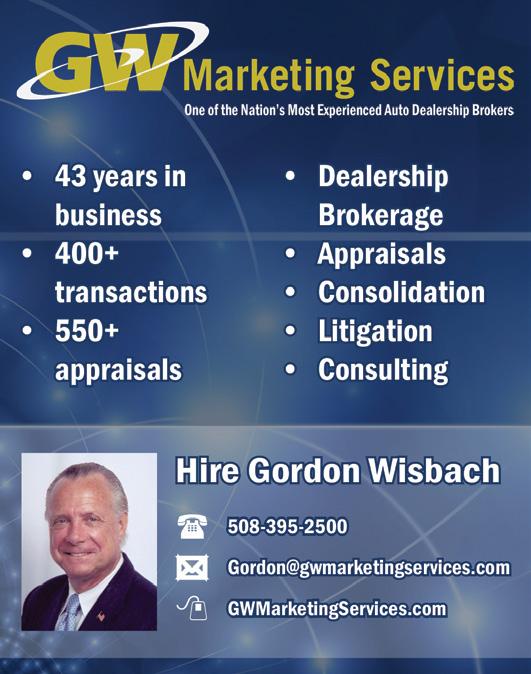
offer was higher. She was in New Jersey to meet with union leaders to secure their agreement, the sources said.
On October 1, the ILA launched the strike by 45,000 port workers, its first major work stoppage since 1977, after talks for a new six-year contract broke down. At least 45 container vessels that have been unable to unload were anchored outside the strike-hit East Coast and Gulf Coast ports by the next day, up from just three before the strike began, according to Everstream Analytics.
JP Morgan analysts have said the strike would cost the U.S. economy around $5 billion per day. The strike affected 36 portsincluding New York, Baltimore and Houston - that handle a range of containerized goods.
“The decision to end the current strike and allow the East and Gulf coast ports to reopen is good news for the nation’s economy,” National Retail Federation said in a statement. “The sooner they reach a (final) deal, the better for all American families.”
National Association of Manufacturers CEO Jay Timmons said “cooler heads have prevailed and the ports will reopen” and called it “a victory for all parties involved - preserving jobs, safeguarding supply chains and preventing further economic disruptions.”
Economists have said the port closures would not initially raise consumer prices because companies had accelerated shipments in recent months of key goods. However, a prolonged stoppage would have eventually filtered through, with food prices likely to react first, according to Morgan Stanley economists.


By Barton Haag CPA, Albin Randall & Bennett
Protecting your business is critical, especially in the face of natural disasters such as hurricanes, floods, wildfires, and tornadoes. According to the Federal Emergency Management Agency, about a quarter of businesses are unable to re-open after being hit by a major disaster. Potential costs can include repairing damaged buildings, replacing lost inventory, restoring business operations, and other increased expenses during recovery periods.
Auto dealerships face unique challenges due to their large, valuable, and highly vulnerable inventories of vehicles. To safeguard your dealership and ensure a quicker recovery, a well-rounded disaster preparedness plan focused on financial readiness is essential. This plan should involve risk assessment, mitigation strategies, financial planning, and recovery actions tailored to the specific needs of automobile dealerships.
Start by identifying the natural disasters most likely to affect your region. Tools such as FEMA’s National Risk Index or NOAA’s local weather forecasts can help you evaluate potential hazards and guide your planning. This risk assessment will inform the strategies you implement to protect your facilities and inventory.
For your facilities, consider reinforcing buildings, adding flood barriers, or investing in backup generators to minimize property damage and reduce operational downtime. When it comes to your vehicle inventory, explore options like moving cars to higher ground, raising them on platforms, or pre-
paring to temporarily relocate them to safer locations when severe weather is anticipated.
Comprehensive insurance coverage is another crucial element of your disaster plan. Review your policies to ensure that you have proper protection, including coverage for flood, earthquake, and hurricane damage, as well as business interruption. Gaps in your coverage could leave you vulnerable to significant financial losses in the aftermath of a natural disaster.
Alongside robust insurance, it is prudent to establish a financial safety net. This can take the form of an emergency savings fund with several months’ worth of operating expenses or a pre-approved line of credit. These resources can help you cover urgent operational costs, pay employees, and begin repair work before other sources of aid become available.
In addition to physical and financial preparations, employee safety and preparedness are paramount. Create a clear disaster response plan that includes procedures for employee evacuation, emergency communication, and securing the facility. Regularly train your staff on these protocols and maintain up-to-date contacts for key personnel, insurance agents, and emergency services. This will help streamline your response and recovery efforts when disaster strikes.
Because of the highly valuable inventory involved, automobile dealerships face unique challenges that set them apart from many other businesses and require specific considerations when faced with disaster. Persistent maintenance of detailed records of your vehicle inventory should include photographs, serial numbers, and locations. Storing this crucial data securely offsite or in the cloud can ensure that it is not lost due to physical damage at your dealership. Additionally, establish pre-arranged agree-
ments with logistics companies to quickly relocate vehicles to safer areas before a disaster, which can significantly minimize damage to your inventory.
Be mindful of the increased risk of theft and fraud during natural disasters. Ensure that your dealership’s security system is robust and capable of functioning even during power outages, deterring potential looters. Additionally, be cautious of fraudulent schemes involving the sale of damaged vehicles as undamaged in the aftermath of a disaster.
Several resources are available to help dealerships financially prepare for and recover from natural emergencies. The Small Business Administration offers low-interest disaster loans, including funding for mitigation projects. The National Automobile Dealers Association also provides financial assistance to dealership employees affected by these events. Furthermore, FEMA and state-level programs may offer rebuilding support, temporary relocation services, tax relief, or grant programs to aid in your recovery efforts. Knowing what programs are available, which apply to your specific circumstances, and how to access these programs can be a difference maker at a critical juncture for your business.
By establishing a comprehensive disaster preparedness plan that addresses the unique needs of automobile dealerships, you can mitigate the impact of natural emergencies and ensure the continued success of your business. With the right financial safeguards and recovery strategies in place, you will be better equipped to protect your dealership, employees, and future revenue when disaster strikes. Consider consulting with a financial advisor who specializes in risk mitigation for automobile dealerships to help you create a tailored strategy. Please contact me or one of our Dealership Services team members for more information.


By Jeff Caruso
CPA, Partner at Withum
In a letter to the French scientist JeanBaptiste Leroy in 1789, Benjamin Franklin wrote, “Our new Constitution is now established and has an appearance that promises permanency, but in this world, nothing can be said to be certain, except death and taxes.” The Constitution indeed has changed over the years through amendments and judicial interpretations. Still, the fact remains the only certainties we have are death and taxes.
We are constantly hearing about new tax proposals in the media. So, while we will always have taxes, we are often left with the uncertainty of what the tax landscape actually will look like down the road. This always is exacerbated in a presidential election year. Even once the Oval Office is filled and the new Congress is established, where the “new” tax code will land is still in flux until it is not. We think that, if either party takes control, there will be sweeping tax reform. If the parties controlling Congress and the Presidency are split, we could end up with compromised legislation.
In any operational or long-term investment decision, you have to consider taxes; however, they should not be the only driver of the business decision. Does this expenditure help my business become more profitable? Should I sell this investment because I have maximized my expected return and could utilize the net proceeds for other investments? Should I implement my succession plan? What assets have a high probability of appreciation over the years?
Let us focus on what we do know with absolute certainty today about taxes. Absent any law changes, when the clock
strikes midnight on December 31, 2025, tax liabilities will increase for many business owners, and the amount of wealth that can be transferred tax-free will change dramatically due to expiring provisions of the Tax Cuts and Jobs Act. While there are several provisions that sunset, we will focus on a few key ones that will have the most significant impact.
The top tax rate for individual taxes will revert to 39.6% from 37%, and all rates and brackets will revert back to the 2017 amounts adjusted for inflation. This, coupled with the expiration of the qualified business income deduction of 20%, could raise a taxpayer’s effective tax rate by 10%. For example, taxable income of $1,000,000 from a passthrough entity for an individual in the highest tax bracket will see an increase of taxes of about $100,000.
This does not account for the impact of expiring bonus depreciation and interest expense limitations that will drive up the taxable income. Bonus depreciation has been declining by 20% each year and will be zero for property placed in service in 2027 (60% in 2024 and 40% in 2025).
The typical year-end tax planning point is to defer income and accelerate expenses where possible. However, coming into 2025, it may make sense to do the opposite and pay some tax at the “lower” rates. Place extra scrutiny on year-end accruals and lower cost or market inventory adjustments. Rather than deferring compensation, it may make sense to take that compensation now.
Tax planning and determining the timing of estimated tax payments will be essential to manage cash flow as there will be significant shifts in income taxes even when book income might remain in line with previous years.
With estate and gift taxes, the TCJA doubled the exemption from 2018 to 2025. For 2024, it is $13,610,000 per spouse. In 2026, it reverts to roughly $6,000,000, adjusted for inflation per spouse. Keep in mind that many states have separate exemption amounts. The Massachusetts exemption is
currently $2,000,000. Estates exceeding that amount are subject to state estate taxes. There is no clawback provision for those who gift before the sunset but pass after the sunset. Also, a donor cannot use part of his or her exemption now and preserve the balance for later use. If you are married, consider having one spouse make a large gift to utilize his or her exemption to get “at least one bite of the apple.”
With an appropriate valuation of assets completed, the value of the transferred assets can be discounted by the application of well-established factors. The amount of assets that can be transferred via the increased exemption amount is expanded substantially. Common discount factors include lack of marketability, lack of control, and restrictions on subsequent transfers. Despite repeated threats of the “loophole closing,” valuation discounts withstand IRS scrutiny.
Leveraging transfers through valuation discounts provides opportunities to transfer undivided partial interests in real estate and family businesses, including recapitalization of voting and non-voting stock. Focusing on assets expected to appreciate significantly in the future allows growth to occur outside of your taxable estate.
If you have been considering transferring wealth, this process should absolutely start now. As we approach the end of 2025, the professionals involved with valuing assets, preparing the appropriate documents, and filing the appropriate tax returns will be increasingly busy impacting turnaround times and the ability to complete it all on time.
As we approach significant shifts in tax legislation, particularly with the sunset of critical provisions of the Tax Cuts and Jobs Act, business owners and individuals alike must stay informed and proactive. Strategic tax planning, timely decisions, and leveraging available exemptions and deductions can help mitigate the impact of these changes. By focusing on what we can control and preparing for what lies ahead, we can navigate the uncertainties of the tax landscape with greater confidence and clarity.

There are over 1,500 attorneys in the United State who focus on legal actions against car dealers.
Who reviews your F&I documents for legal or regulatory changes?
What if your dealership had access to a complete suite of documents needed in F&I?

Only the LAW F&I Library™ provides:
A complete set of state-specific F&I documents in both pre-printed and electronic formats.
An industry leading team of in-house and outside legal resources reviewing forms for legally required and best practice updates.
A trained team of compliance consultants who can work with you to manage your compliance risks.
By Tom Vangel, Jamie Radke, and Lindsey McComber of Murtha Cullina LLP
In recent months, auto dealers and officials across various industries in Massachusetts have expressed concern over the looming deadline for the implementation of the Advanced Clean Truck (ACT) and the Heavy-Duty Omnibus (HDO) rules which are scheduled to go in effect in Massachusetts on January 1, 2025. These rules require that manufacturers sell an increasing number of zero emission medium- and heavy-duty vehicles greater than 8,500 pounds GVWR, from 2024 to 2035. The implementation of these rules as scheduled will have a major impact on Massachusetts automobile dealers as well as unintended consequences for the transportation sector as a whole.
In 1991, the Massachusetts Legislature passed Mass. Gen. Laws. Ch. 111, § 142K to reduce emissions produced by motor vehicles, including automobiles, as well as medium- and heavy-duty trucks. The statute requires the adoption of California’s standards for motor vehicle emissions as long as those standards achieve greater emission reductions than federal standards. It also prevents auto dealers and other manufacturers from selling or offering for sale a motor vehicle or motor vehicle engine that is not compliant with California’s standards during or after the first model year that the motor vehicle standards are in effect. Violators face stiff fines and possible criminal penalties.
Pursuant to this statute, the Massachusetts Department of Environmental Protection enacted regulations under 310 CMR 7.40 to reduce emissions of pollutants and greenhouse gases from on-road vehicles to help mitigate climate change and improve air quality. In 2021, the Department of Environmental Protection amended these regulations and adopted California’s regulations under the ACT and the HDO rules. The ACT rule requires medium- and heavy-duty vehicle manu-
facturers to sell zero-emission vehicles as an increasing percentage of their annual sales through 2035, while the HDO rule sets stricter standards for NOx and PM emissions. These regulations would result in greater emission reductions than the federal standards.
Although MGL Ch. 111, § 142K does not set a timeframe for implementation of the HDO and ACT rules, the regulations amended by the Commonwealth require adherence to California’s stricter standards starting in 2025. This will have a significant negative effect on Massachusetts auto dealers because manufacturers have not yet developed enough trucks to meet demand. Further, small business dealerships for medium- and heavy-duty trucks likely will not be able to meet the required sales mandate. Trucking companies will be disincentivized to purchase compliant trucks from them because they are more expensive and there is not a reliable network of charging stations. This is likely to result in fleet owners keeping older, less energy efficient vehicles on the road for a longer period of time, which will counteract the regulations’ underlying goal of reducing emissions.
Due to a number of issues with the implementation of these rules, the MSADA is advocating for a delay in the enforcement of these regulations until 2027. In its joint letter with the Trucking Association of Massachusetts (TAM), the MSADA outlines three major issues with the implementation of these regulations: (1) Massachusetts does not currently have enough public or private charging stations for commercial vehicles; (2) the cost of a compliant vehicle is significantly higher than a comparable diesel truck and there are not enough vehicles available for purchase; and (3) Massachusetts will lose sales tax revenue.
Both organizations emphasized that
they are fully in support of the efforts to reduce emissions in the transportation sector; however, they are both wary of the effects of these regulations as Massachusetts does not currently have the technology and infrastructure needed for the regulations to not have disastrous effects on the transportation sector and all other industries relying on it. Therefore, they argue that delaying the enforcement of these regulations until 2027 is more practical because 2027 is the year that the EPA and CARB are in agreement over common emissions standards, and because it will allow Massachusetts time to develop infrastructure to support these regulations.
Thirty-eight members of the Massachusetts House of Representatives also sent a letter to the Governor and the Secretary of the Executive Office of Energy and Environmental Affairs raising similar concerns. Like the MSADA and TAM, the representatives are concerned that Massachusetts does not have the infrastructure to support adherence to these requirements. They note that if this regulation is implemented on January 1, 2025, its effect actually may slow the reduction of emissions, while having a large, negative impact on many industries across both the private and public sectors. Like the MSADA, they ask that the Governor move back the implementation date to January 1, 2027.
If these regulations are enforced in January 2025, auto and truck dealers in Massachusetts will need to make sure that they understand the complex requirements and develop a plan to become compliant.
Tom Vangel and Jamie Radke are partners and Lindsey McComber is an associate with the law firm of Murtha Cullina LLP in Boston who specialize in automotive law. They can be reached at 617-4574072.
By Jeff Fritz, Esq., and Joshua Nadreau, Esq., Fisher Phillips LLP
The election season is well underway, and it is ramping up in intensity, turbulence, and rhetoric every day. The level of discourse seems to have coarsened significantly in recent years, and the political temperature is running particularly hot in some circles. As you may already have experienced, the workplace is not immune from challenges the election season presents, especially these days. This article focuses on some of them and offers guidance on how to navigate them.
To be sure, employees have a First Amendment right to say essentially almost anything they want. But the First Amendment’s “Freedom of Speech” guarantee generally only restricts state action by the government and not private employers deciding how to manage their workplaces. So, while employees certainly have a First Amendment right to free speech, they are not immune from workplace repercussions should their speech violate their employer’s policy. They cannot say anything they want and reasonably expect no consequences for inappropriate speech.
Does that mean employers have carte blanche to discipline employees for any political speech in which they engage? Not necessarily. While federal antidiscrimination laws do not directly protect political activity or speech, your worker’s activity or speech potentially could trigger them. If the discussion directly (or even indirectly) involves race, color, sex, sexual orientation gender identity, national origin, religion, age, or disability, you need to be careful. An employee could claim your action responding to their political discussion on such subjects is actually a proxy for illegal discrimination. Think twice before taking adverse action and consult counsel. You will also want to be consistent in how you address political discussion so as not to create any appearance of preferential treatment based on a
protected characteristic.
It is worth noting that the National Labor Relations Board has found an employer in violation of federal labor law, where it terminated an employee for writing “BLM” on its uniform. According to the NLRB, such expression implicates an employee’s rights to engage in protected concerted activity in the workplace and applies to union and non-union employees alike.
On the other hand, you should ensure your managers refrain from expressing negative opinions about political candidates based on any protected status. Negative comments, either in the workplace or after hours, about a candidate’s (or his or her spouse’s) age, gender, religion, or race, for example, or about an issue bearing on such things, can easily find their way into a discrimination charge. If a manager expresses his or her view, for instance, that one candidate is too old for the job and then terminates an older employee (for reasons having nothing to do with age), the employee (and his or her lawyer) may try to link the two in pursuit of a claim. Similarly, if a manager expresses negative views of, say, transgenderism, it presents a heightened risk of a claim for gender discrimination. Moreover, you should train your managers on how to spot unproductive or heated conversations between subordinates and address them appropriately (i.e., by immediately informing Human Resources or any employee designated to investigate and address such conduct).
If employees want to wear political apparel or buttons or hang political posters, you need to ensure you create and implement a consistent dress code or appearance policy. Be sure to enforce any rules prohibiting the same consistently. For example, if you do not allow employees to wear “MAGA” hats in support of Trump, you also should not let them wear hats
promoting Harris or any other candidate. Likewise, you can establish reasonable, consistent limits on posters and other workplace displays so long as you comply with the NLRA.
Generally you can prohibit employees from engaging in political activities in the workplace, such as campaigning or distributing political literature during work hours. That said, you need to ensure any non-solicitation rules do not run afoul of the law. Make sure to distinguish between union-related activities or other actions taken for the mutual aid and protection of your workers, which are protected, from political speech.
And while private companies certainly have the right to express their own political views, any decision about whether and, if so, how your business demonstrates support for a candidate or position should be made deliberately and with the input of all leadership and stakeholders. Consider your company culture and how your employees (and/or customers) might perceive it. That said, suggesting employees support a candidate or position and/ or requiring them to attend meetings concerning the same can be a risky proposition.
Finally, keep in mind that Massachusetts law generally requires employers to grant leave to employees to vote during the period of two hours after the opening of polls in the voting precinct, ward, or town in which such employee is entitled to vote. The law technically requires employees wanting such leave to request it in advance. While employers need not pay employees for such time off, they certainly may.
Jeff Fritz and Joshua Nadreau are partners at Fisher Phillips LLP. They can be reached at (617) 722-0044.
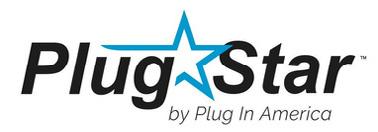

I N C R E A S E E V S A L E S W I T H E V C E R T I F I C A T I O N
PlugStar com connects consumers and certified dealers to drive EV sales Designed to enhance the EV shopping experience, the PlugStar program provides dealers with tools, knowledge, and ongoing support through education, certification and resources. Plug In America, the organization behind PlugStar, represents America's deepest pool of EV drivers and is the national leader in EV consumer education

T R A I N E D sales staff sell 4 x as many EVs as U N T R A I N E D
a l e r s c a n b e c o m e a P l u g S t a r
C e r t i f i e d D e a l e r s h i p
P r i o r i t y d e a l e r o p p o r t u n i t i e s t o p a r t i c i p a t e i n P l u g
I n A m e r i c a ' s r i d e - a n d - d r i v e e v e n t s , w h i c h p r o v i d e
f a c e - t o - f a c e i n t e r a c t i o n s w i t h p o t e n t i a l c u s t o m e r s
P R O V E N T R A I N I N G
Our convenient online training takes about two hours to complete and covers:
E V f u n d a m e n t a l s
E V c h a r g i n g b a s i c s
K e y E V s e l l i n g p

Since the launch of the PlugStar program five years ago, Plug In America has trained thousands of dealer and manufacturer sales staff from almost every major automaker. Each PlugStar program has recorded improvements of up to 80% in EV salesperson confidence while discussing utility rates and programs, government incentives, the availability and costs of charging at home and on the go To learn more, visit PlugInAmerica.org/PlugStar.



By Tim Marbut Ethos Group
A business owner always must ask, “Are my people worth more today or less today than when I hired them?”
Assets typically depreciate over time, meaning their value or worth slowly diminishes the longer we keep them. We either have a depreciating asset (i.e., car, trailer, boat), or we have an appreciating asset (i.e., real estate).
We often say that our greatest assets in business are our people. Competence, experience, and consistent growth give them this designation. However, the appreciation of our greatest assets depends on how we help them learn, grow, and feel.
A common belief is that if they are winners, they will self-educate (resulting in their growth). The reality is complacency and comfort set in quickly with most people. Once they learn just enough to become somewhat successful, they will stagnate instead of pushing forward to continued growth. This may be enough for them, but it is not good for the growth of your business.
Continual education is imperative for the consistent growth and success of your company. This education must come from multiple channels. Corporate training, self-education, and outside learning opportunities must be not only encouraged but also required. In our industry, we often do not expect our people to continue to learn and grow.
The experienced employees with good to moderate success help to create our
comfort zone or expected results. We do not want to bother them with the same old training efforts. We just leave them alone and expect them to naturally get better with time. The problem with that idea is we do not get better at anything we do with just repetition.
We get better with perfect practice, analyzation of execution, and learning new ideas about a subject. We should always push our people to work toward their potential because it is always greater than their current reality no matter how successful they are.
If we are concerned with appreciating our biggest asset, their competence is not
“Not every difficult and dangerous thing is suitable for training, but only that which is conducive to success in achieving the object of our effort.”
- Epictetus
the only area on which we should focus. Their validation, valuation, and sense of purpose are just as important, in fact, maybe more important. People love to feel wanted, important, and recognized.
Validating our people (assets) should be a daily focus. Employee validation is saying, “I see you and recognize your importance to our company.” This can be expressed in many ways such as acknowledging their existence when seeing them, complimenting their work in front of colleagues, being concerned with their family’s needs, and providing something special for them before they request it.
Validation can also be expressed simply with a smile and a hello.
Building their value not only comes through their growth and opportunities to learn, as mentioned earlier, but also by giving new job opportunities, delegating tasks only superiors worked on in the past, or even just asking their opinion about an idea or subject.
Building on their sense of purpose is also imperative to asset appreciation; however, we must focus on their sense of purpose within the company’s main purpose for existing. Far too often we make people think their personal sense of purpose falls under the company’s purpose; however, they are separate issues. We should help them understand and embrace their sense of purpose within the company’s main purpose.
Growing your business comes directly through the growth of your people:
• Train expectations;
• Monitor progress;
• Push employees to their next level;
• Reward growth;
• Validate, enhance value and tie them into the company’s purpose.
In any business, people are the greatest asset. Without the right people, the company’s vision can never be executed. Education, training, and personal growth must be not only encouraged but required. This is the only way your number one asset will be worth more today than yesterday. Take the steps today to see how much your greatest assets can appreciate. t
For more information on how Ethos Group can help your dealership develop more leaders in your F&I office, sales management tower, and your sale’s floor in 2024, please contact Drew Spring by email at dspring@ethosgroup.com or phone at (617) 694-9761.

Patrick Manzi NADA Senior Economist
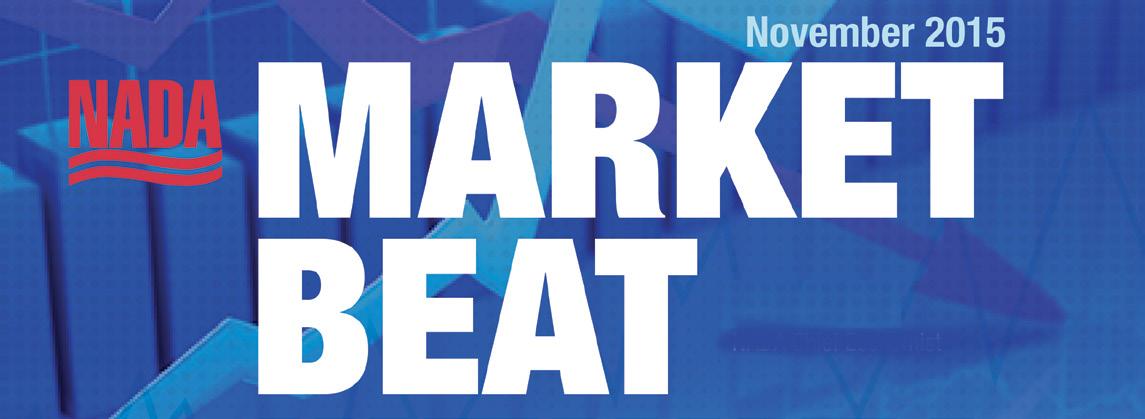
New light-vehicle sales in September 2024 totaled a SAAR of 15.8 million units, an increase of 0.5% year over year. Following a strong start to the year in Q1 2024, where raw sales volumes were up 4.9% year over year, sales in Q2 and Q3 have declined by 0.5% and 1.9% year over year. The result: Through nine months of the year, raw light-vehicle sales volume totaled 11.69 million units— an increase of just 0.7% year over year. Given the low growth in sales volumes, we have reduced our full-year 2024 sales forecast slightly from 15.9 million to 15.7 million units.
Sales of alternative-fuel vehicles have grown in 2024, but growth has not been equal across all powertrains. Conventional hybrid vehicles continue to be strong sellers, with sales up by 32.8% year over year through September. Sales of plug-in hybrids (PHEV) and battery electric vehicles (BEV) have grown as well, but not as much as conventional hybrids. Through three quarters of the year, PHEV and BEV sales were up 11.4% and 6.6% year over year, respectively. Franchised dealers continue to gain market share in BEV sales. Through the first nine months of
the year, BEV sales by franchised dealers accounted for 45.7% of all new BEVs sold. At the same point in 2023, BEV sales by franchised dealers were 39.3% of all BEV sales.
In September 2024, the Fed announced its first cut to the federal funds rate this cycle, lowering the targeted range by 50 basis points. While it is still too soon to see the effect on auto loan rates, we expect that this first cut and expected subsequent cuts in Q4 2024 will lower rates on auto loan finance contracts and provide some relief to consumers struggling with vehicle affordability. J.D. Power estimates the average rate on a new vehicle finance contract in September 2024 will be 6.84%.
New light-vehicle inventory has increased throughout 2024. At the end of September 2024, there were 2.8 million light-vehicles on the ground and in transit. Looking ahead we expect inventory to continue to build toward 3 million units through November before declining slightly in December, as is typical at the end of the year
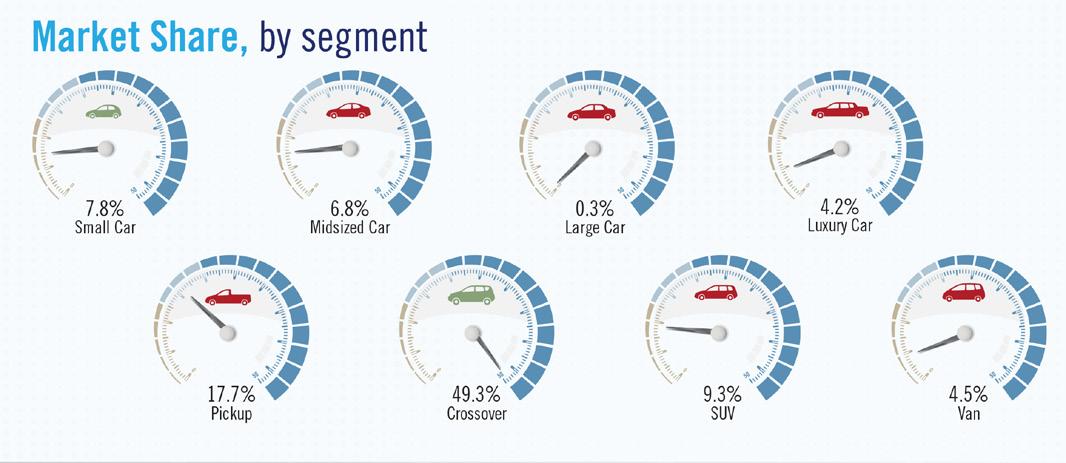
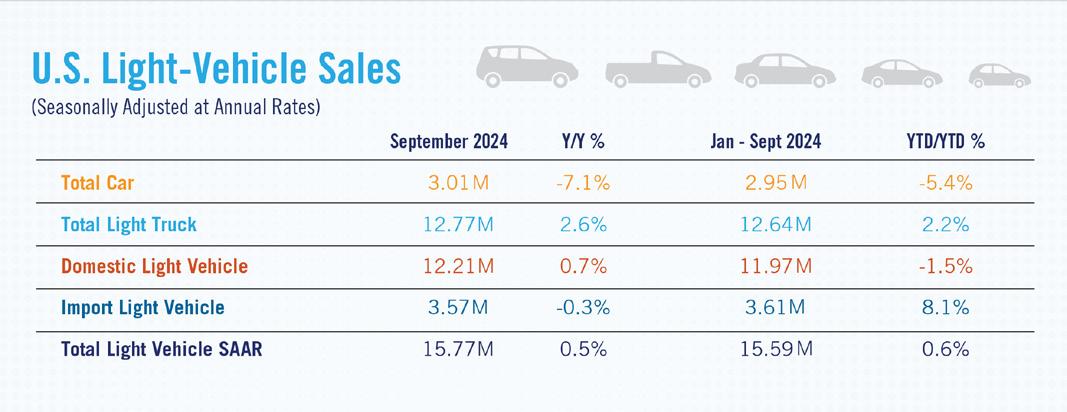
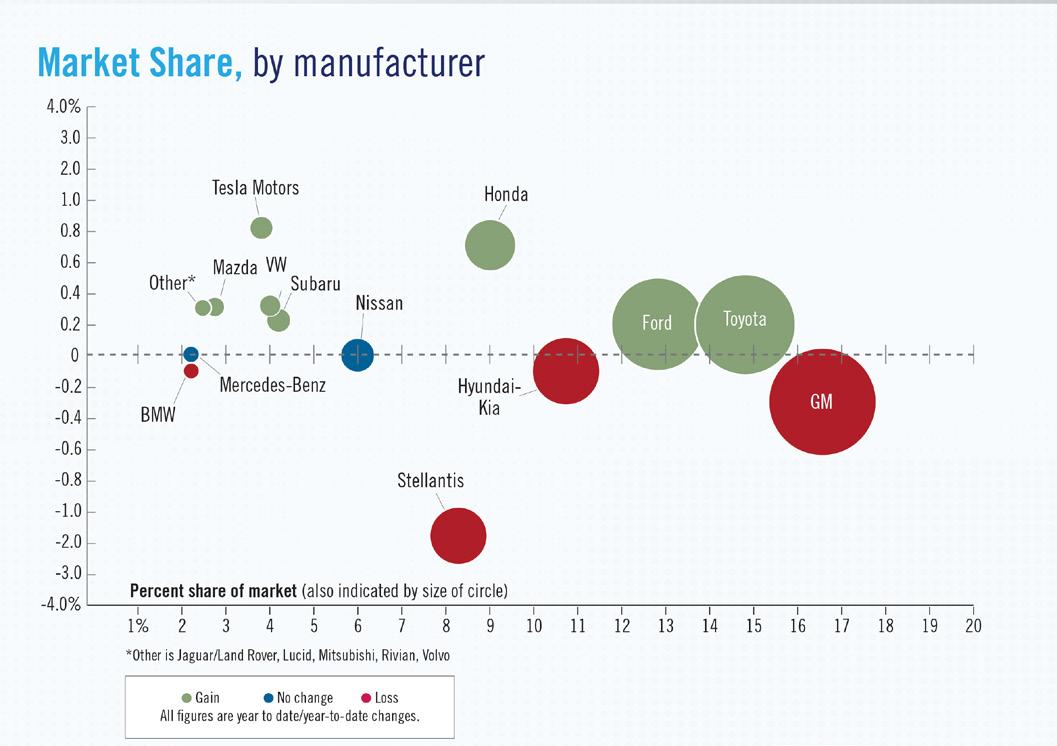

By Cody Lusk President & CEO, American International Auto Dealers Association
With the first, and maybe only, presidential debate done, dealers have a better sense of how both candidates would approach the issue of trade. As it stands, no matter who wins the White House in November, advocates for global trade will have their work cut out for them.
It is no surprise that trade, tariffs, and
themselves on how each candidate would approach the issue of trade. It is also important to take into consideration how Congress would be part of the discussion as policy changes would require legislation to move through both the House and the Senate.
During the debate in Pennsylvania, Donald Trump re-affirmed his plan to raise tariffs on imported goods. He has proposed a 10-20 percent tariff on all foreign goods, as well as a 60 percent tariff on Chinese imports. While economists say it is difficult to predict exactly how the market would react to higher tariffs, they do agree that the tariffs President Trump put in place during his previous administration, and which the Biden/Harris ad-
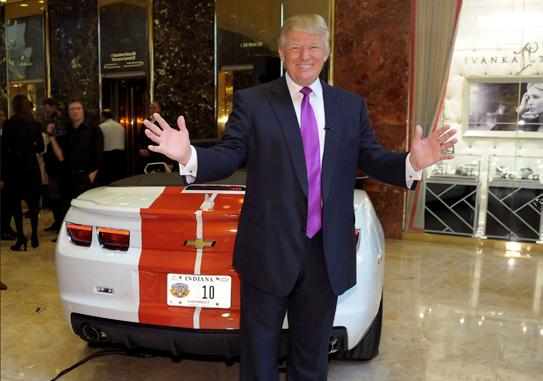
focus on cracking down on unfair foreign trade practices. The big question is how will her policies do that?
For international nameplate dealers looking for a candidate with a deep understanding of global trade and how it benefits the U.S. economy, September’s presidential debate was a must-watch. At this point, both candidates seem comfortable simply offering familiar rhetoric about supporting American workers. As advocates for our industry, it is our responsibility to remind candidates and lawmakers that the auto industry, domestic and abroad, relies on a complicated and carefully balanced web of trade. Drastic changes to standing agreements and tariffs will lead to higher prices on window
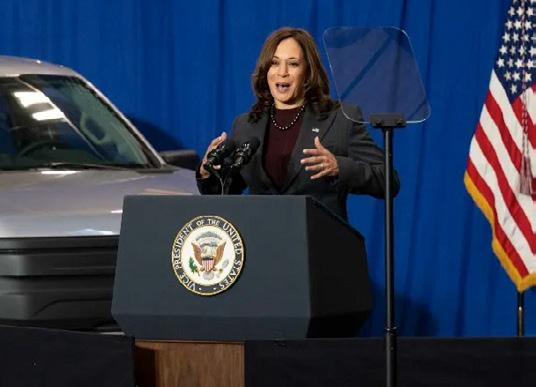
the tariffs President Trump put in place during his previous administration, and which the Biden/Harris administration has mostly upheld, increased costs for average American households by about $830 per year.
taxes were some of the hottest topics of the debate, outside of pet consumption. The economy ranks as one of, if not THE, top issue for voters. Understandably, Americans are eager to hear what both Trump and Harris would do to keep our economy humming and help middle class voters who are feeling the pinch of inflation.
Whoever takes power in 2025, it is important that dealers, especially international nameplate dealers, educate
ministration has mostly upheld, increased costs for average American households by about $830 per year.
For her part, Kamala Harris has avoided commenting on the Biden administration’s continuation of Trump’s trade policies. While during the debate she called Trump’s plans a “20 percent sales tax,” she has not committed to unraveling his or Biden’s already established tariffs, and instead has said her administration would
stickers, and frustrated voters who are already struggling with their budgets.
Politicians need to remember that consumers – their constituents – are struggling to make ends meet. As dealers, economic uncertainty affects consumer choices that impact your bottom line, and policy decisions on tariffs will affect the economy. For now, I urge you to stay informed as election season heats up.
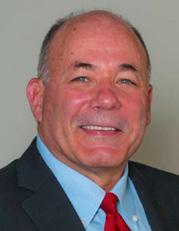
By Scott Pearson Chairman, American Truck Dealers
I recently returned from NADA’s Washington Conference. Like our ATD Legislative Fly-In, this annual event brings auto dealers from every state to Capitol Hill, where they advocate for dealer legislative priorities.
In addition to the auto dealers, our state and metro ATAEs and some fellow commercial truck dealers joined me in these critical advocacy efforts. We were able to connect with our Congressional legislators and discuss our top issues, including a continuation of the conversation regarding the unrealistic emission regulations facing dealers at the state and federal levels.
As dealers, we are the voices of our business and our employees. We also represent our customers and the truck market – the industry. That is why it is so important that we tell our elected officials about what we are experiencing on the ground in the commercial truck industry – what is working and what is not.
For example, the federal and state emissions regulations coming out of the California Air Resources Board and the U.S. Environmental Protection Agency are causing upheaval in the truck market, and, with their current trajectory, that upheaval will only worsen. California is our canary in the coal mine for the truck industry, as it has finalized stringent regulations this year. The state’s total Class 8 truck sales are down 50% year-over-year as of this June 2024, compared to the rest of the US, which is only down 31.9%.
While on Capitol Hill, we also covered:
• The Federal Trade Commission’s recently finalized Vehicle Shopping Rule: FTC Chair Lina Khan finally responded on September 24 to Congressional requests asking if commercial truck dealers are covered under this rule by stating that heavy-duty trucks dealers are regulated by the Vehicle Shopping Rule. The letter further stated that, “In fact, the Rule does not impose substantial costs, if any, on dealers…” ignoring that (1) this statement is not a fact; (2) the FTC failed to ascertain any regulatory costs on heavy-duty truck dealers, be they substantial or not; and (3) by the FTC’s own admission, the rule imposes over $1 billion in regulatory costs on light-duty dealers alone. This rule will add massive amounts of time, complexity, and unnecessary paperwork and costs to the commercial purchase of a heavy-duty truck. ATD strongly opposes this rule and is working to repeal it.
• So-called “right to repair” legislation (H.R. 906): ATD opposes this legislation, which has little to do with repairing a vehicle. Instead, the bill compels truck and auto manufacturers to provide any “aftermarket parts manufacturer” the information necessary “to produce or offer compatible aftermarket parts”. This legislation sweeps in heavy-duty trucks and would give any third-party access to sensitive truck buyer data from vehicles, which raises privacy, vehicle security, and safety concerns.
• Supporting Catalytic Converter Anti-Theft Legislation (H.R. 621/S. 154): Catalytic converter theft continues to rise across the nation. We urged Members of Congress to cosponsor the PART Act, which would provide local law enforcement with the resources necessary to combat this crime. ATD is working to add diesel particulate filters and diesel oxidation catalysts to the bill, so the theft of these devices would also be a federal crime.
• Repealing the 12% Federal Excise Tax on Heavy-Duty Trucks (H.R. 1440/S. 694): We urged Members of Congress to cosponsor the bipartisan “Modern, Clean and Safe Trucks Act of 2023.” The legislation would repeal the 12% FET on heavy-duty trucks and help promote the transition to a cleaner, greener, and safer truck fleet.
As we walked the halls of Congress, our assignment was to tell our elected officials what is happening on the ground in the truck market. Now, our assignment for all truck dealers is to show legislators – federal, state, and local – what is happening to our small businesses.
How do we do that?
• Invite your elected officials and industry regulators to your dealerships. Most people do not understand our business, including the people regulating it. The best way to educate them is by bringing them to your dealership where they can see the business in action and meet your employees and customers.
• Schedule meetings in your state capitols. If you cannot bring your legislators to you, go to them. Explain to them the needs of your customers and how their business and yours is impacted by state and federal regulation.
• Engage with your Automotive Trade Association Executives (ATAEs). If you are not involved in your state or metro dealer association, reach out
to ATD and ask how you can build that relationship and for contact information. You can email ATD President Laura Perrotta at lperrotta@nada.org to get the contact info. If you are already a member of your local dealer association, contact them and tell them you want to support advocacy on these important issues and ask how you can help.
Everyone needs to be aware of the policies that are coming out of Washington and your respective states. Educate yourselves, your team, and then educate your policymakers. During this critical time and given the many issues we are facing, we all must take action.
Mark your calendars and get ready to head down to the Big Easy! Registration and housing for ATD Show 2025 is officially open. Join us in New Orleans, January 23-25, for an unforgettable experience packed with industry insights, networking opportunities, and the legendary NOLA charm.
Whether you are a dealer, manager, OEM representative, or industry affiliate, ATD Show is the place to forge new alliances, strengthen existing partnerships, and engage in thought-provoking discussions that will reshape your business strategies and reinvigorate the truck industry.
New Orleans provides the ideal setting for both the ATD Show and NADA Show. Only ATD Show registrants get access to it all!
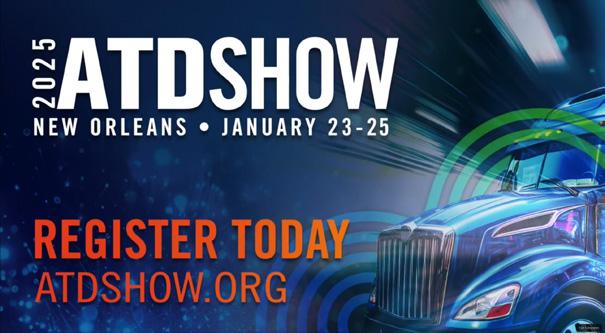
Get ready to immerse yourself in the city’s vibrant culture, indulge in world-class cuisine, and experience the legendary Southern hospitality! NADA Fest promises to be an evening filled with the infectious fun and flair for which New Orleans is famous!
ATD Show 2025 will be held at the Hilton New Orleans Riverside. But we have partnered with 45 hotels across three distinct neighborhoods to ensure you find the perfect accommodation for your needs and preferences.
• Warehouse/Arts District: Immerse yourself in this sophisticated and trendy neighborhood that boasts award-winning dining and stylish boutiques, as well as museums and art galleries.
• Central Business District: This bustling hub offers a vibrant mix
of cultural attractions, trendy restaurants and convenient access to other areas.
• French Quarter: Experience the iconic charm of New Orleans in its most famous neighborhood. Explore world-famous Bourbon Street and soak up the bohemian atmosphere.
Don’t Miss Out! Register Today! Head over to www.ATDshow. org to secure your spot and book your hotel stay. We cannot wait to see you in New Orleans!
Emissions-Free
Prices Need to Drop by 50% to Compete With Diesel, Study Says Reuters
Prices of emissions-free trucks need to fall by as much as half to make them an affordable alternative to diesel models, a study by consultancy firm McKinsey published last month said, a necessary step to help achieve European Union climate targets.
Less than 2% of the EU’s heavy freight vehicles are now electric and hydrogen-powered. To meet the bloc’s carbon emission reduction targets, the share should rise to 40% of new sales by 2030, the study released before the IAA Transportation 2024 truck show in Hanover showed.
Currently, production costs for electric trucks are 2.5-3 times higher than for diesel ones
Currently, production costs for electric trucks are 2.5-3 times higher than for diesel ones, the study said. With logistics firms unwilling to accept higher costs for emissions-free freight, that goal is still distant.
To overcome that, prices for new electric trucks should be no more than 30% higher than for diesel models, McKinsey said, which would require a technological leap in batteries.
For successful implementation of the EU’s CO2 strategy, a 25% cut in charging costs is also needed, the study showed, with 900,000 private charging points to be installed in Europe by 2035, which would require a $20 billion investment.
Chinese manufacturers present another challenge for European truckmakers, as they offer competitive products at cheaper costs. They have already gained a 20% share of the bus market.
“I don’t think it’s impossible that this could actually happen in electric trucks over time,” said Anna Herlt, head of commercial vehicle consulting at McKinsey, who co-authored the study.
Are you following ATD on social media? If not, follow ATD’s social channels to get more updates, news, see the latest blog posts, and more. You can follow ATD on Facebook, Twitter, LinkedIn, and join our ATD NextGen group on LinkedIn.
September 2024
Patrick Manzi, Chief Economist
New commercial truck sales totaled more than 381,000 units through the first three quarters of the year, a decline of 6.3% year over year. Heavy-duty truck sales were the primary driver of the decline. Sales of heavy-duty trucks were just shy of 203,000 units at the end of the third quarter, a decline of 12.5% compared to the same period a year ago. Medium-duty truck sales were up slightly, totaling more than 178,000 units—an increase of 0.9% year over year.
New commercial truck sales totaled more than 381,000 units through the first three quarters of the year, a decline of 6.3% year over year. Heavy-duty truck sales were the primary driver of the decline. Sales of heavy-duty trucks were just shy of 203,000 units at the end of the third quarter, a decline of 12.5% compared to the same period a year ago. Medium-duty truck sales were up slightly, totaling more than 178,000 units—an increase of 0.9% year over year.
New commercial truck sales totaled more than 381,000 units through the first three quarters of the year, a decline of 6.3% year over year. Heavy-duty truck sales were the primary driver of the decline. Sales of heavy-duty trucks were just shy of 203,000 units at the end of the third quarter, a decline of 12.5% compared to the same period a year ago. Medium-duty truck sales were up slightly, totaling more than 178,000 units—an increase of 0.9% year over year.
According to ACT Research, orders for new Class 8 trucks posted their first positive year-over-year gain in three months. In September 2024, preliminary orders of Class 8 trucks totaled 37,100 units, an increase of 0.3% year over year and double the order volume of August 2024. The primary reason for the jump in orders from August to September was the OEMs opening their order books for the 2025 model year. Nonetheless, it is a positive sign for Class 8 truck sales next year. ACT Research estimates that orders for Class 5-7 medium-duty trucks totaled 19,100 units, a decline of 20% year over year.
Pricing for used Class 8 trucks has declined significantly since peaking a few years ago during the microchip shortage. ACT Research estimates the average retail price for a used Class 8 truck in August 2024 was $58,358, a decline of 9.5% year over year. The average transaction price in August 2024 was up by 4.6% when compared with July 2024.
According to ACT Research, orders for new Class 8 trucks posted their first positive year-over-year gain in three months. In September 2024, preliminary orders of Class 8 trucks totaled 37,100 units, an increase of 0.3% year over year and double the order volume of August 2024. The primary reason for the jump in orders from August to September was the OEMs opening their order books for the 2025 model year. Nonetheless, it is a positive sign for Class 8 truck sales next year. ACT Research estimates that orders for Class 5-7 medium-duty trucks totaled 19,100 units, a decline of 20% year over year.
According to ACT Research, orders for new Class 8 trucks posted their first positive year-over-year gain in three months. In September 2024, preliminary orders of Class 8 trucks totaled 37,100 units, an increase of 0.3% year over year and double the order volume of August 2024. The primary reason for the jump in orders from August to September was the OEMs opening their order books for the 2025 model year. Nonetheless, it is a positive sign for Class 8 truck sales next year. ACT Research estimates that orders for Class 5-7 medium-duty trucks totaled 19,100 units, a decline of 20% year over year.
terest rates across the economy. We expect two more cuts of 25 basis points each before the end of the year. However, these cuts will take time to work through the economy. This lower-interest-rate environment should be a tailwind for truck sales next year as well as a tailwind for many companies served by America’s commercial trucking industry. For example, lower interest rates should positively impact both residential and nonresidential construction, which likely will increase demand for freight hauling.
Since the previous Truck Beat this summer, the Fed announced a cut of 50 basis points to the federal funds rate, which should lower interest rates across the economy. And we expect two more cuts of 25 basis points each before the end of the year. However, these cuts will take time to work through the economy. This lower-interest-rate environment should be a tailwind for truck sales next year as well as a tailwind for many companies served by America’s commercial trucking industry. For example, lower interest rates should positively impact both residential and nonresidential construction, which likely will increase demand for freight hauling. Looking out to the end of 2024, we expect total sales of commercial vehicles will decrease slightly. Our truck-sales forecast is for 247,000 medium-duty units and 234,000 heavy-duty units.
Looking out to the end of 2024, we expect total sales of commercial vehicles will decrease slightly. Our truck-sales forecast is for 247,000 medium-duty units and 234,000 heavy-duty units.
Pricing for used Class 8 trucks has declined significantly since peaking a few years ago during the microchip shortage. ACT Research estimates the average retail price for a used Class 8 truck in August 2024 was $58,358, a decline of 9.5% year over year. The average transaction price in August 2024 was up by 4.6% when compared with July 2024.
Since the previous Truck Beat this summer, the Fed announced a cut of 50 basis points to the federal funds rate, which should lower interest rates across the economy. And we expect two more cuts of 25 basis points each before the end of the year.
However, these cuts will take time to work through the economy. This lower-interest-rate environment should be a tailwind for truck sales next year as well as a tailwind for many companies served by America’s commercial trucking industry. For example, lower interest rates should positively impact both residential and nonresidential construction, which likely will increase demand for freight hauling. Looking out to the end of 2024, we expect total sales of commercial vehicles will decrease slightly. Our truck-sales forecast is for 247,000 medium-duty units and 234,000 heavy-duty units.
Pricing for used Class 8 trucks has declined significantly since peaking a few years ago during the microchip shortage. ACT Research estimates the average retail price for a used Class 8 truck in August 2024 was $58,358, a decline of 9.5% year over year. The average transaction price in August 2024 was up by 4.6% when compared with July 2024.
Since the previous Truck Beat this summer, the Fed announced a cut of 50 basis points to the federal funds rate, which should lower in-







Scott DuBe, Partner at McGovern
HyunDai rt. 93, rePreSentS
naDa’S MaSSacHuSettS MeMBerS on tHe naDa BoarD of DirectorS He can Be reacHeD at SDuBe@ McGovernauto.coM.
In September, we had another successful Washington Conference where your MSADA representatives and your fellow dealers’ footsteps echoed in the halls of our Nation’s Capital. Over 400 dealers, their key managers, and auto dealer association executives attended and participated in over 200 Congressional visits during last month’s conference. You can find more details of our trip in this month’s magazine, including a recap of NADA’s key legislative issues for this year.
I want to give a heartfelt “thank you” to our hardworking MSADA and NADA staffs and all the dealers from across the country who took the time to make the trip to D.C. Our collective voice is that much stronger when we band together.
Finally, our NADA Show 2025 in New Orleans is coming up on January 23-26. It is not too late to register. The exhibition floor space is sold out, and hotel rooms are going fast. You can find all the necessary registration information below and on www.nada.org.
Don’t Let the Clock Run Out: Register Now for NADA Show 2025
We are counting down to NADA Show 2025!
Do not delay - Hotel rooms are going fast, so be sure to register today. NADA partners with hotels to offer you the best rates. On average, rooms are 31% cheaper than if you booked directly.
You cannot afford to miss out on four days packed with education sessions, an Expo triple the size of the Superdome, main stage speakers and networking opportunities. There’s something for everyone!
Learn at Your Own Pace: Prepare for a multi-faceted learning experience featuring world-class speakers and engaging education sessions, tailor-made by subject track. Choose from 80+ education sessions, where you’ll gain insights into the latest strategies and emerging trends.
Gain Momentum with Main Stage Speakers:
1. Ryan Leak, best-selling author and executive coach, Leading By Example: 6 Keys to Success
2. John Cena, actor, producer, author, philanthropist and WWE superstar, From the Ring to the Road
3. Coach K, head men’s basketball coach, Duke University (1980-2022), Victory Through Teamwork and Leadership
Meet With OEMs: Learn the latest updates and changes happening within your franchise, directly from its senior leadership.
Experience Expo: Explore the industry’s premier marketplace of products, services, and technology. Connect with current providers and shop for new suppliers among 500 exhibitors across 800,000 square feet – that’s triple the size of the Superdome!
Network and Reconnect: NADA Show truly is the Auto Industry Event of the Year. And you cannot afford to miss the non-stop networking among fellow dealers and managers, OEM representatives, exhibitors, and industry affiliates.
Thursday night Welcome Party at the Mississippi Heritage Park and the Sugar Mill: Let the good times roll at our fun and festive welcome reception. Part jazz fest, part bayou bash — with all the flair of NOLA — rolled into one unforgettable event! You will not want to miss out! Network with fellow dealers, OEMs, exhibitors, and industry affiliates, as you:
• Enjoy a taste of New Orleans, from po’boys and jambalaya to bourbon and beignets!
• Experience jazz where jazz was born. Revel in the music of Grammy Award winner Trombone Shorty!
• Be entertained by alligator handlers, tarot card readers and so much more!
See you in New Orleans!
NADA Foundation’s Emergency Relief Fund Ready to Assist Dealership Employees Impacted by Hurricane Helene
By Andrew Koblenz
NADA Executive Vice President, Strategic Affairs and Industry Initiatives
The NADA Foundation Chairwoman Annette Sykora announced that the NADA Foundation’s Emergency Relief Fund is ready to help dealership employees and their families impacted by the devastation of Hurricane Helene.
“For more than a decade, the Emergency Relief Fund has helped dealership employees and their families weather all kinds of natural disasters and tragedies, from Hurricane Ka-
trina and Harvey, to wildfires, tornadoes and floods,” said Sykora, who is a Ford dealer in West Texas and a former NADA chairwoman. “The foundation is ready to help dealership employees with needed financial assistance — and fast.”
NADA has been in contact with the leadership of the state and metro associations in the impacted states, including Florida, Georgia, South Carolina, North Carolina, Virginia, and Tennessee, to help employees impacted by Helene. Affected dealership employees can apply for assistance on the Foundation website at www.nadafoundation.org. Emergency grants up to $1,500 are given based on need and a sliding scale developed by the Foundation.
Donations to the Foundation are tax deductible. To give to the Emergency Relief Fund, go to www.nadafoundation.org.
On September 23, 2024, NADA Dealer Stellantis Representatives, NADA Executives, NADA’s Industry Relations team, and members of the Stellantis National Dealer Council met with Carlos Zarlenga, Stellantis NA COO, and other key executives to share the results of the NADA Summer Dealer Attitude Survey and discuss dealer dissatisfaction that was made public in recent weeks.
Key issues they discussed were market share loss, rising inventories, dealer profitability, product quality, and product pricing. Executive departures and multiple rounds of layoffs were also cited as contributing to dealer dissatisfaction. Dealers recommended the brand take bold and immediate action, simplify operations, and communicate a plan for future success.
Mr. Zarlenga listened carefully as the dealers in attendance fleshed out aspects of each concern. He responded that current issues had developed over time and have had long term impacts. He said the brand could not ask for blind trust from dealers and must earn trust back over time.
What’s Next: Dealers asked for Stellantis to share a plan that will result in an improved partnership and offer hope and assurances for the future. NADA will continue to support the actions of the Stellantis dealer council and monitor dealer feedback for reactions to Stellantis’ marketplace actions. NADA will directly re-engage with Stellantis as required.
By Jared Allen NADA Vice President of Public Affairs
We are excited to announce some upcoming changes to the email communications you receive from NADA.
What’s new: NADA is launching an update to our emailbased member communications tools and platforms, all with an eye to decreasing quantity, and improving quality and clarity. Why it matters: First, we have already implemented an up-
dated style and format – Smart Brevity – in order to keep our communications focused and brief, consolidating the information in our updates to the key messages for our dealer members (always with the option to “go deeper”). You will notice that emails are shorter and organized by each issue’s key takeaways. Additionally, starting October 14, some of our familiar branded communications will be rebranded or removed. What’s changing:
• 60 Second Emails as a brand will be eliminated. The 60 Second communication is currently used to allow Directors and ATAEs to preview All-Dealer email communications an hour early. This separate communication is duplicative.
• All-Dealer Emails will be replaced by Issue Alerts. These timely updates on our issues will be sent to all dealer members, Directors and ATAEs at the same time.
• Compliance Alerts will no longer have previews. These compliance updates will be sent to all dealer members, Directors and ATAEs at the same time.
• Directors Alerts will be used to communicate with VIP audiences. This new communication tool will be used to communicate exclusively with VIP audiences – Directors and/ or ATAEs.
• Capitol Hill Bullets will be replaced with the Public Policy Update. This biweekly communication to ATAEs will provide updates on the legislative and regulatory issues in a more efficient format.
• Headlines PM will include fewer policy-related news stories and more dealer-focused stories and features. All policy-related news items will be conveyed through Headlines AM. (Remember: you must subscribe to receive both Headlines AM and PM).
• ATD Line Representatives who receive the above email products will see these changes. What is staying the same:
• Again, the information (now always in Smart Brevity format) that NADA has always provided Directors and ATAEs will remain flowing without change or interruption.
• Directors and ATAEs will still receive the monthly NADA Main Issues Update outlining messaging points on our top issue, as well as the quarterly NADA Chairman’s Column.
• All subscribers will still receive Headlines AM and PM every weekday.
• ATAEs will still receive Jennifer Colman’s biweekly Friday ATAE News.
• ATD Insider and the ATD Monthly Issues Update will be unaffected.
The big picture: With the changes, NADA is completing phases one and two – email and branding – of our Policy Communications Project, unveiled in June. We remain on schedule for the additional two phases of this project – texting (December 2024) and the potential development of an app (June 2025).


